Photogenic Olympians
The 2008 Beijing Olympics was of an unprecedented scale in modern Olympic history, in terms of the manpower and money put into it. Many of us may still remember its spectacular and spellbinding opening ceremony, and the torch relay with so many hiccups. The Chinese government perceived the Olympic events and the medals won by Chinese athletes as national glory that could stimulate patriotic sentiments. More importantly, China was so eager to demonstrate its soft power following the economic boom after becoming the “world’s factory”, and the Olympics provided the perfect opportunity. During the Olympics, we saw the five-starred Chinese national flags being more prominent than the Olympic flags with the five rings in the host city of Beijing.
Under the hot summer sun in August, outside the venues of the games, I took portraits of citizens who came from all different provinces of China. Most of them could not afford the tickets, and just came and hang around off the venues to experience the atmosphere and look at the expensive structures built for the games, including the “Bird’s Nest” (Beijing National Stadium) and the “Water Cube” (Beijing National Aquatics Center). These venues, together with the almost ecstatic atmosphere in the capital city, worked like a magnet drawing crowds from all over China. People behaved collectively in the same unnameable manner, to express their pride as if these venues were built for them. Although this was not the case in reality, they still enjoyed themselves without any complaint. Beneath the happiness engraved on their faces was patriotism that shrouded the whole Beijing city.
At the same time, the massive efforts to facelift the city owing to the Olympics resulted in little harmony with the people. This ambiguous contrast between the people and the city inspired me to think of the other side of the story. The Chinese people themselves were perhaps the real “Olympic athletes”. Although they knew they would not win any medals, nor would their sacrifices be rewarded, they still put their hopes on the Olympics and on their country.
Under the hot summer sun in August, outside the venues of the games, I took portraits of citizens who came from all different provinces of China. Most of them could not afford the tickets, and just came and hang around off the venues to experience the atmosphere and look at the expensive structures built for the games, including the “Bird’s Nest” (Beijing National Stadium) and the “Water Cube” (Beijing National Aquatics Center). These venues, together with the almost ecstatic atmosphere in the capital city, worked like a magnet drawing crowds from all over China. People behaved collectively in the same unnameable manner, to express their pride as if these venues were built for them. Although this was not the case in reality, they still enjoyed themselves without any complaint. Beneath the happiness engraved on their faces was patriotism that shrouded the whole Beijing city.
At the same time, the massive efforts to facelift the city owing to the Olympics resulted in little harmony with the people. This ambiguous contrast between the people and the city inspired me to think of the other side of the story. The Chinese people themselves were perhaps the real “Olympic athletes”. Although they knew they would not win any medals, nor would their sacrifices be rewarded, they still put their hopes on the Olympics and on their country.
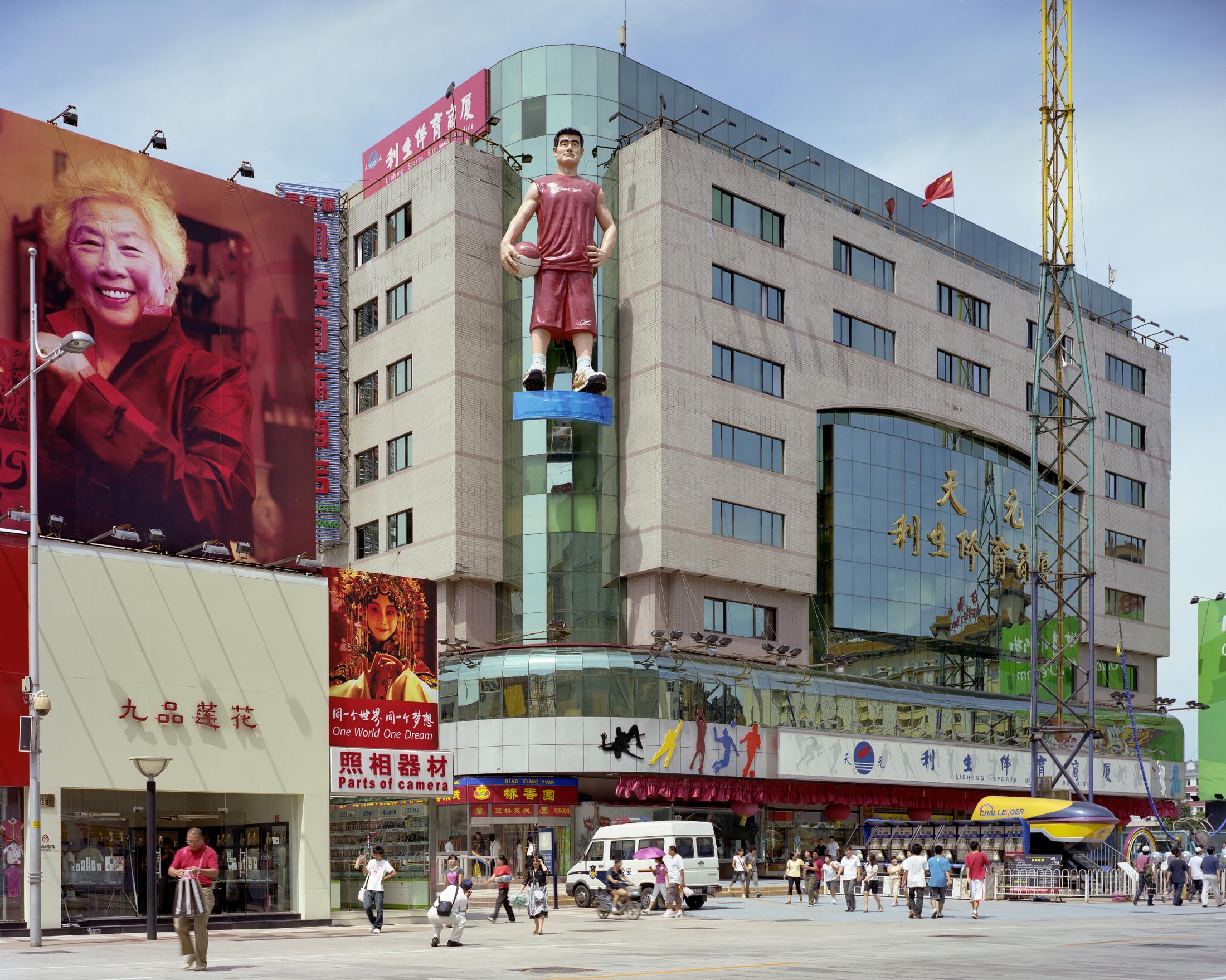
2 / 27
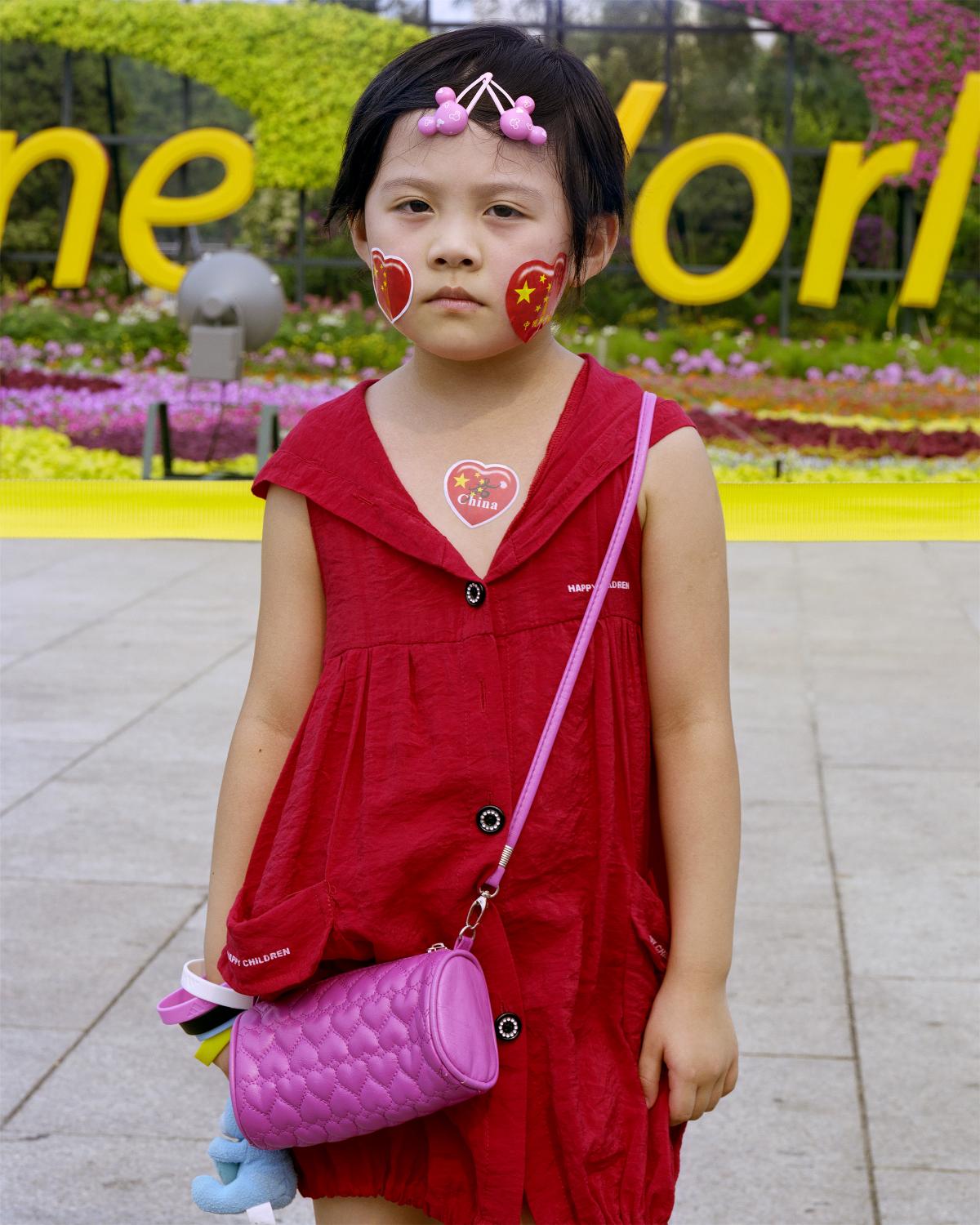
3 / 27
Yang Zeyu, 6, from Dalian. Beijing. 8/2008
楊澤玉,6歲,來自大連。北京,8/2008
楊澤玉,6歲,來自大連。北京,8/2008
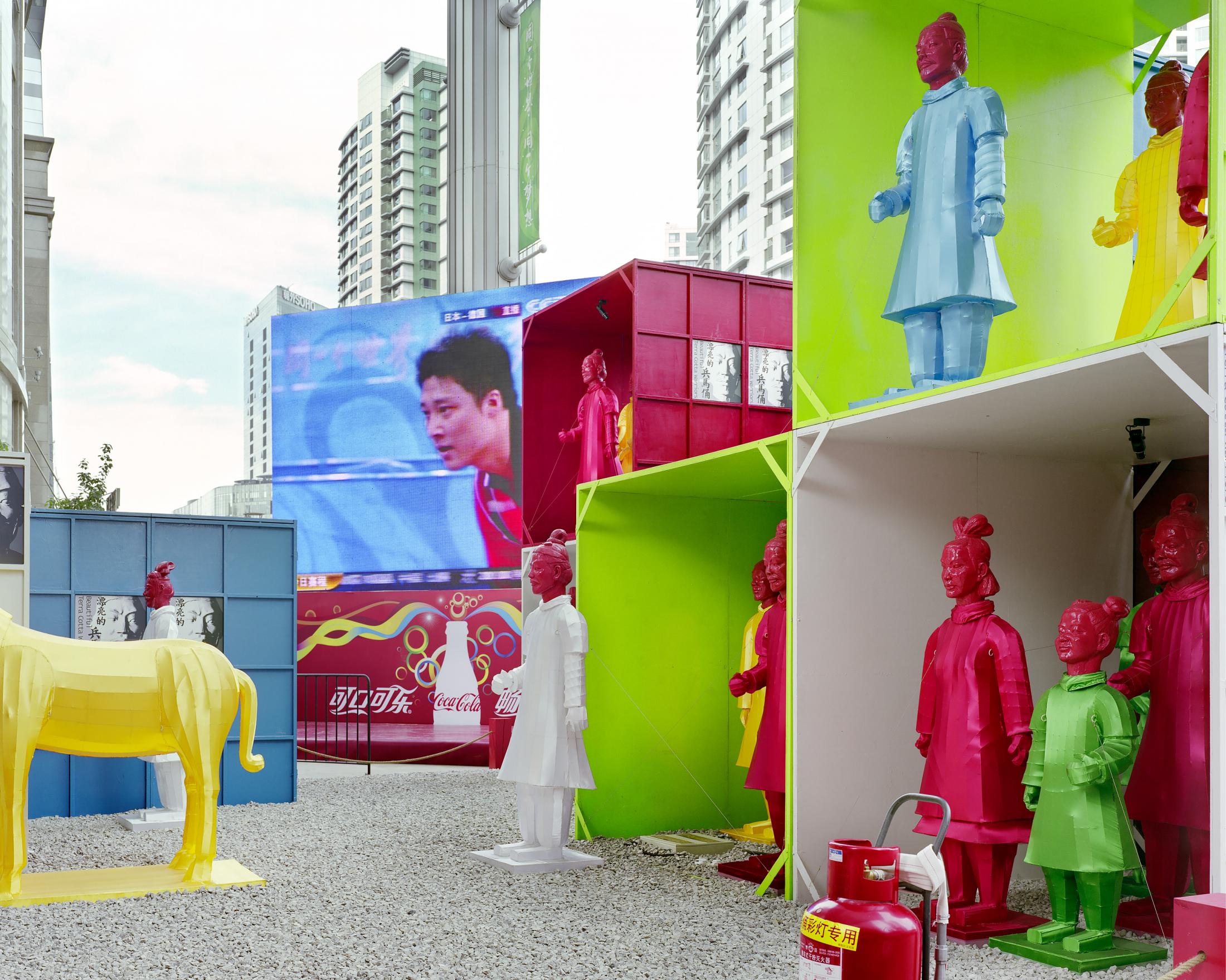
4 / 27
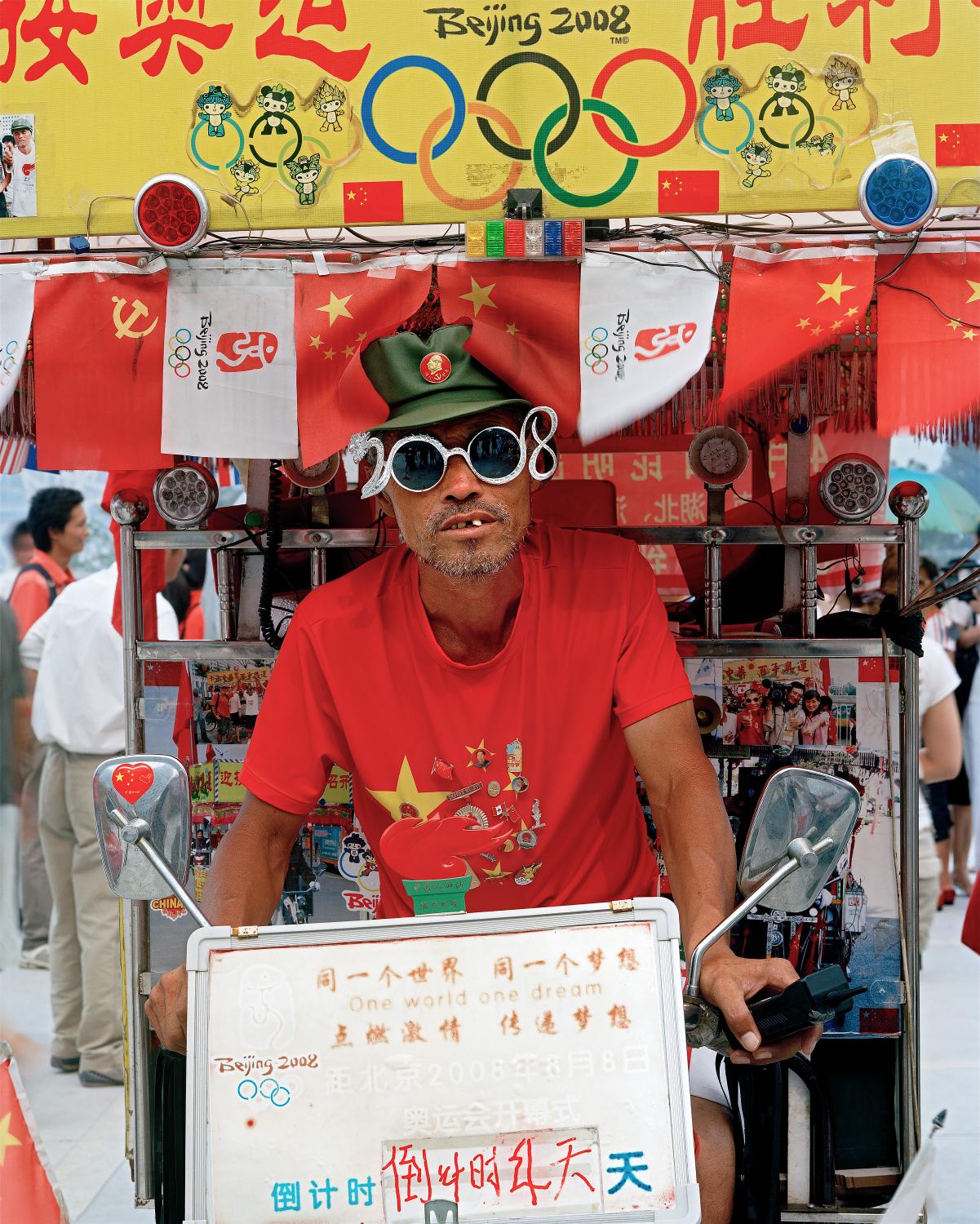
5 / 27
Shi Changlin, 56, a Heilongjiang native, rode his decorated tricycle for over 3,600km to Beijing from Yunnan where he ran a small business. Beijing, 8/2008
石長林,56歲,來自黑龍江雞西,本來在雲南做小生意,騎了3600公里三輪車來到北京。北京,8/2008
石長林,56歲,來自黑龍江雞西,本來在雲南做小生意,騎了3600公里三輪車來到北京。北京,8/2008
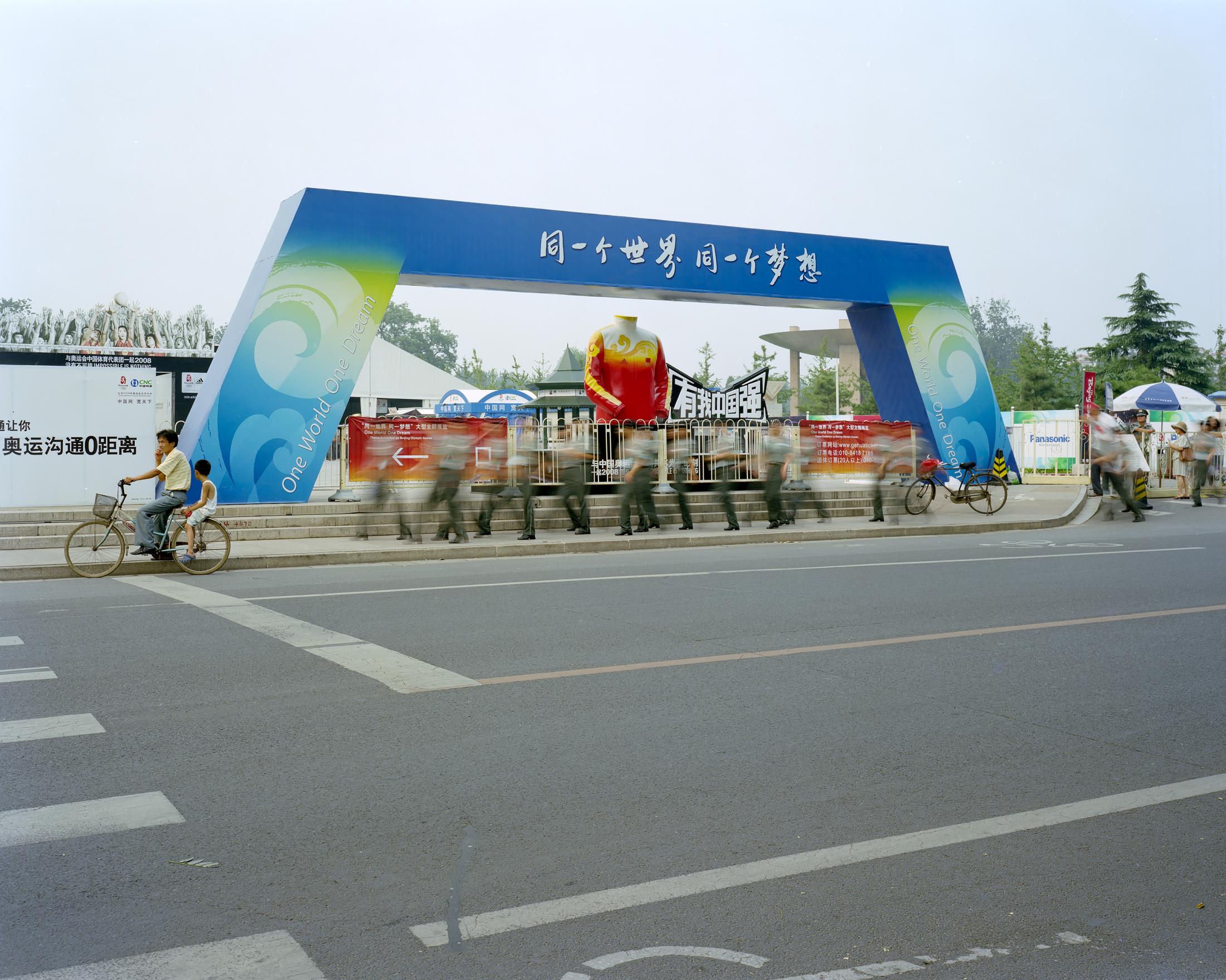
6 / 27
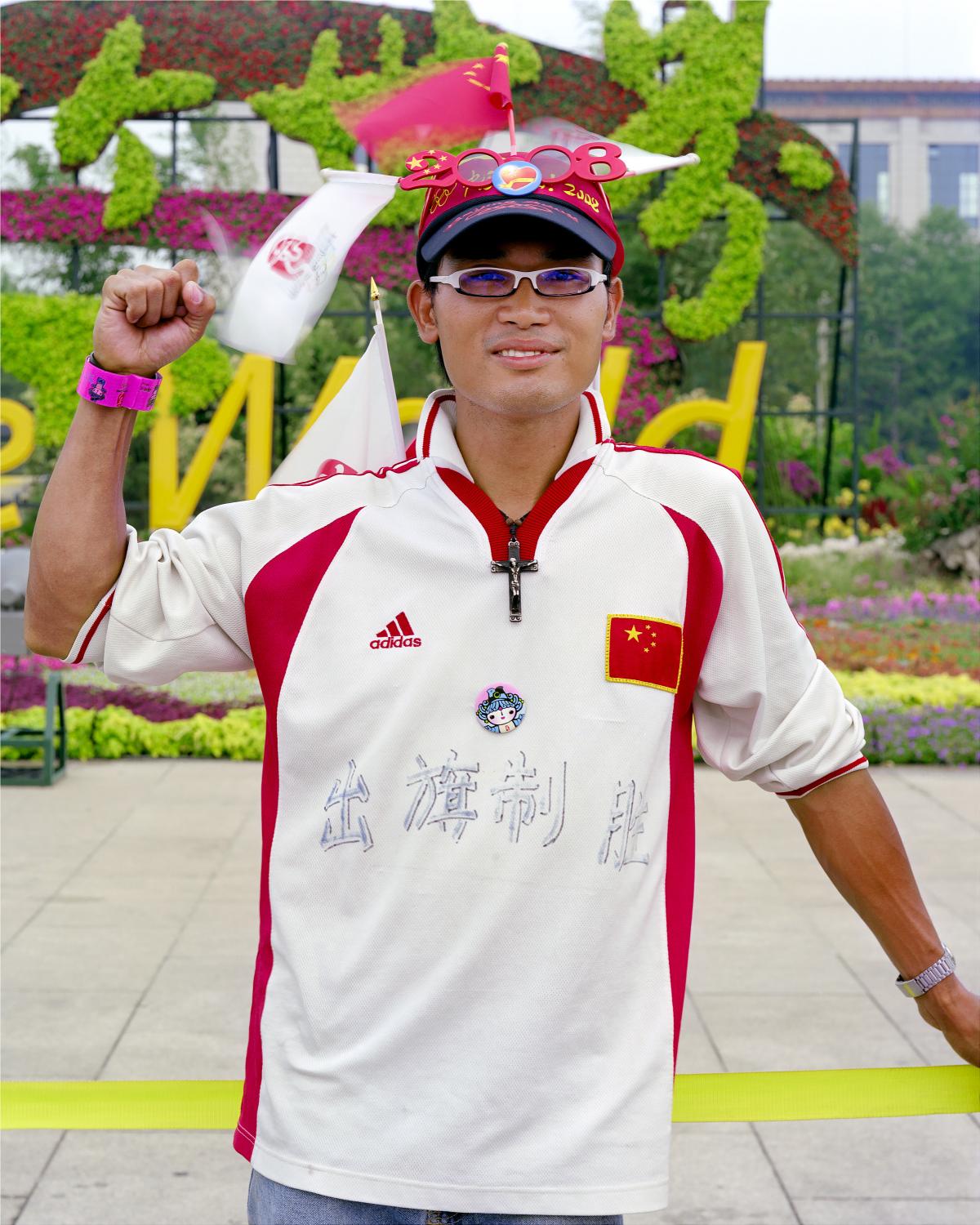
7 / 27
Silly Egg (alias), a university student from Guangzhou.
傻蛋(網名),廣州大學學生,赴京旅遊。北京,8/2008
傻蛋(網名),廣州大學學生,赴京旅遊。北京,8/2008
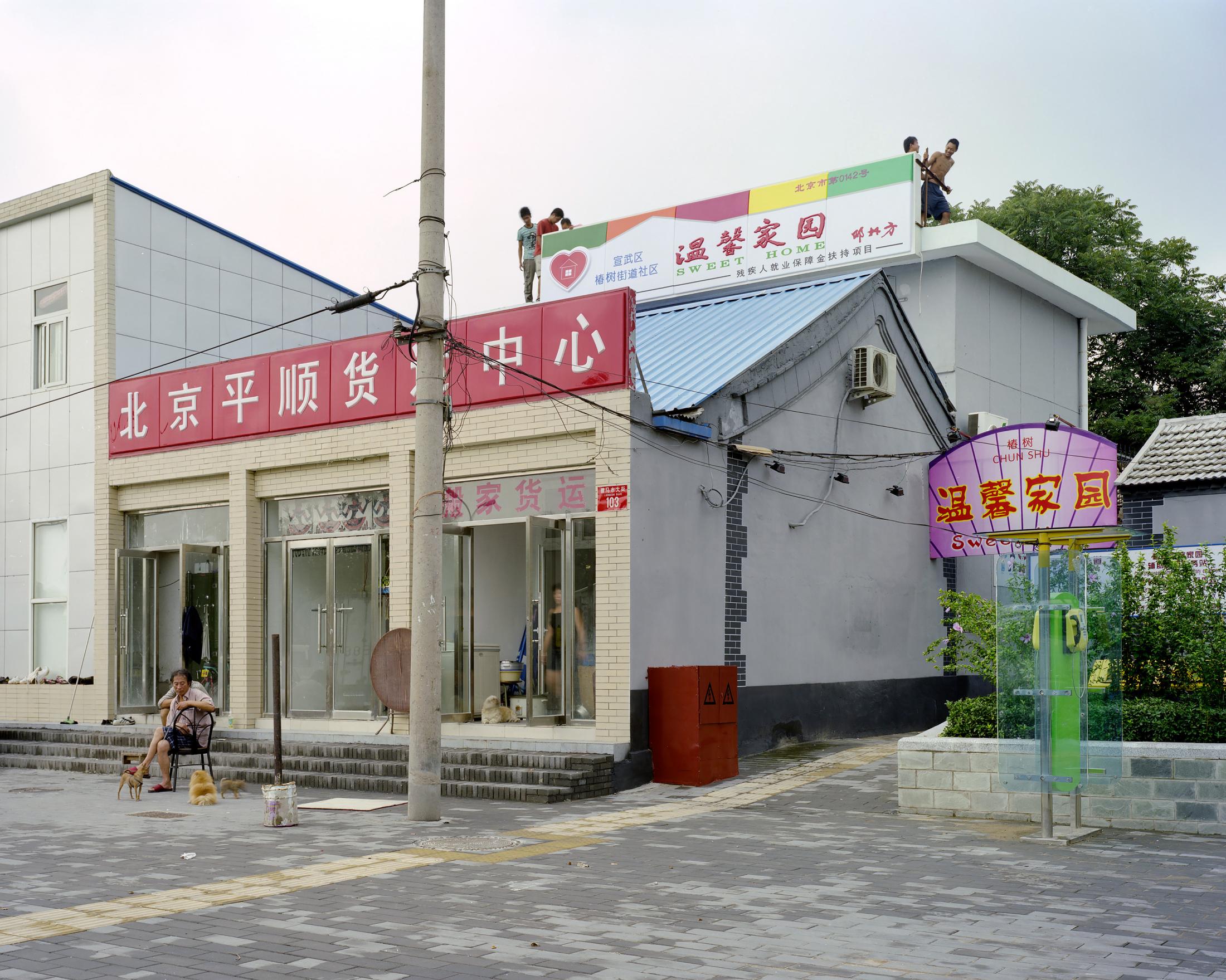
8 / 27
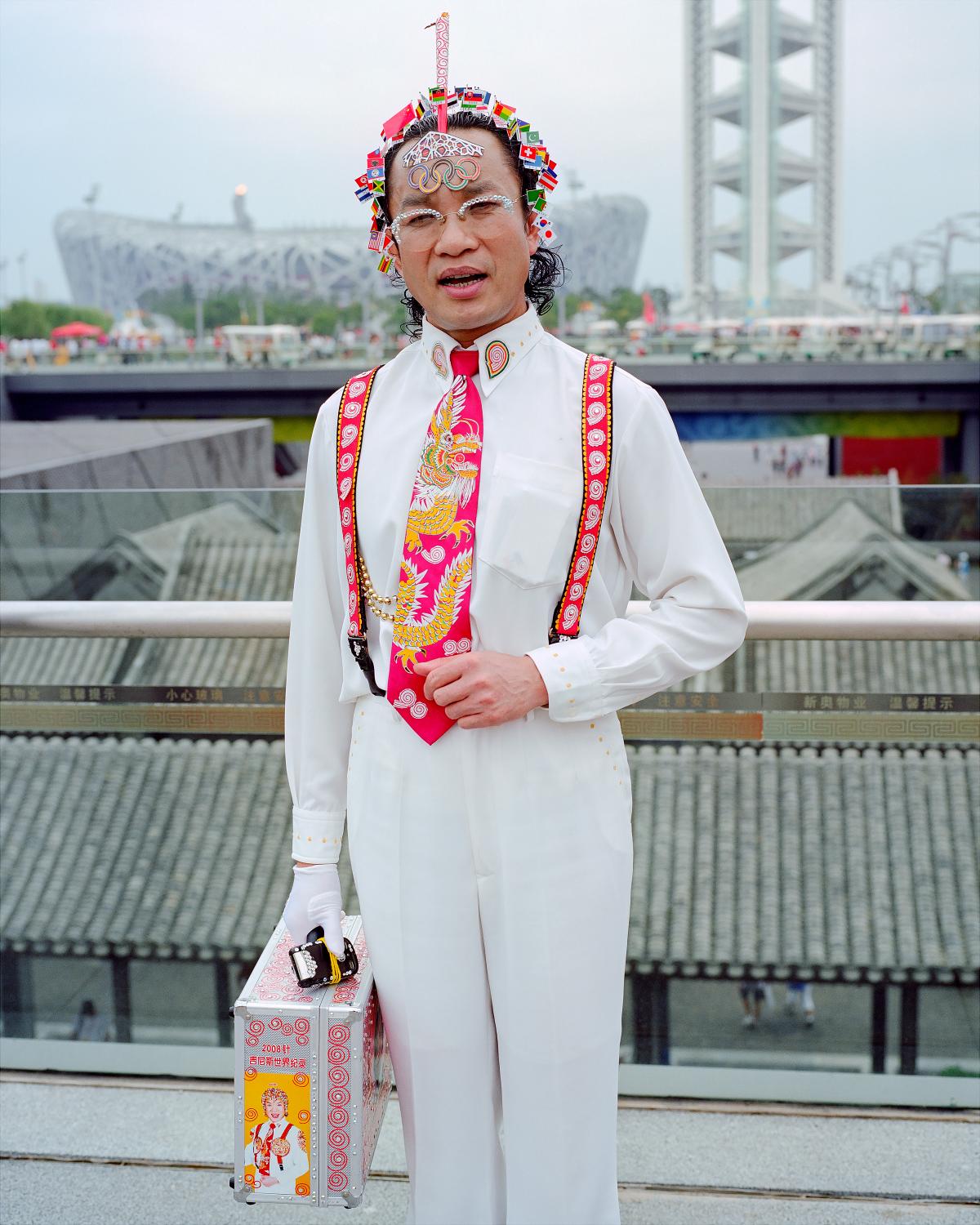
9 / 27
Wen Shengchu, from Guangxi Province, welcomes Olympic
visitors from around the world to China by setting up over 200
miniature flagpoles on his head. Not long ago Wei broke the
world records by peppering his head with 2,008 needles as a
way to commemorate the opening ceremony of the Olympics.
Beijing, 8/2008
韋盛初,來自廣西南寧,聲稱為了迎接來自全世界的奧運遊客,
將200多面小國旗插在自己的頭上。不久前他為了紀念奧運會開
幕,用2008根針扎在自己頭上來打破世界紀錄。北京,8/2008
visitors from around the world to China by setting up over 200
miniature flagpoles on his head. Not long ago Wei broke the
world records by peppering his head with 2,008 needles as a
way to commemorate the opening ceremony of the Olympics.
Beijing, 8/2008
韋盛初,來自廣西南寧,聲稱為了迎接來自全世界的奧運遊客,
將200多面小國旗插在自己的頭上。不久前他為了紀念奧運會開
幕,用2008根針扎在自己頭上來打破世界紀錄。北京,8/2008
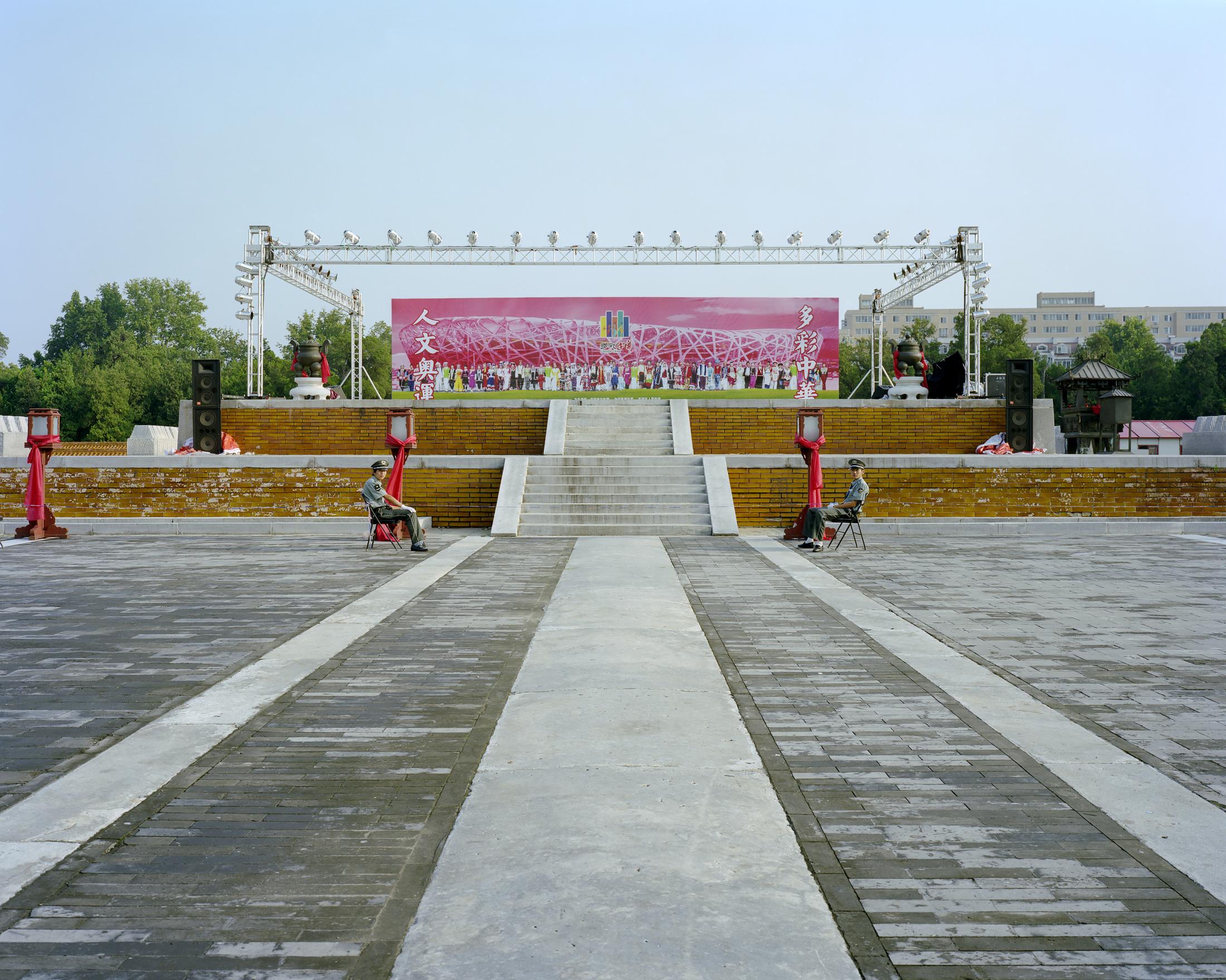
10 / 27
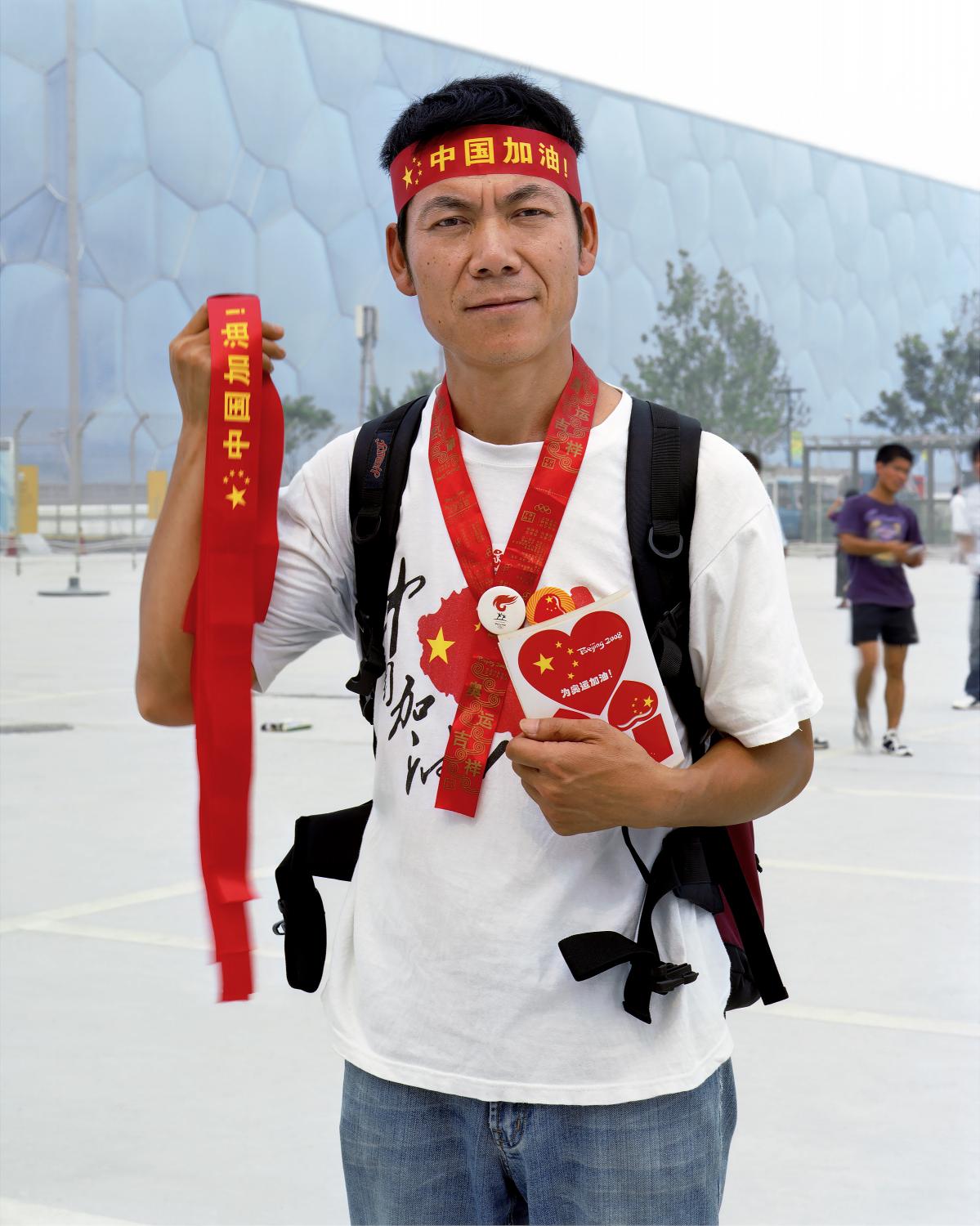
11 / 27
Li Baokui, from Anhui, is a Olympic Torch volunteer guard.
Beijing, 8/2008
李寶奎,來自安徽,奧運火炬護送志願者。北京,8/2008
Beijing, 8/2008
李寶奎,來自安徽,奧運火炬護送志願者。北京,8/2008
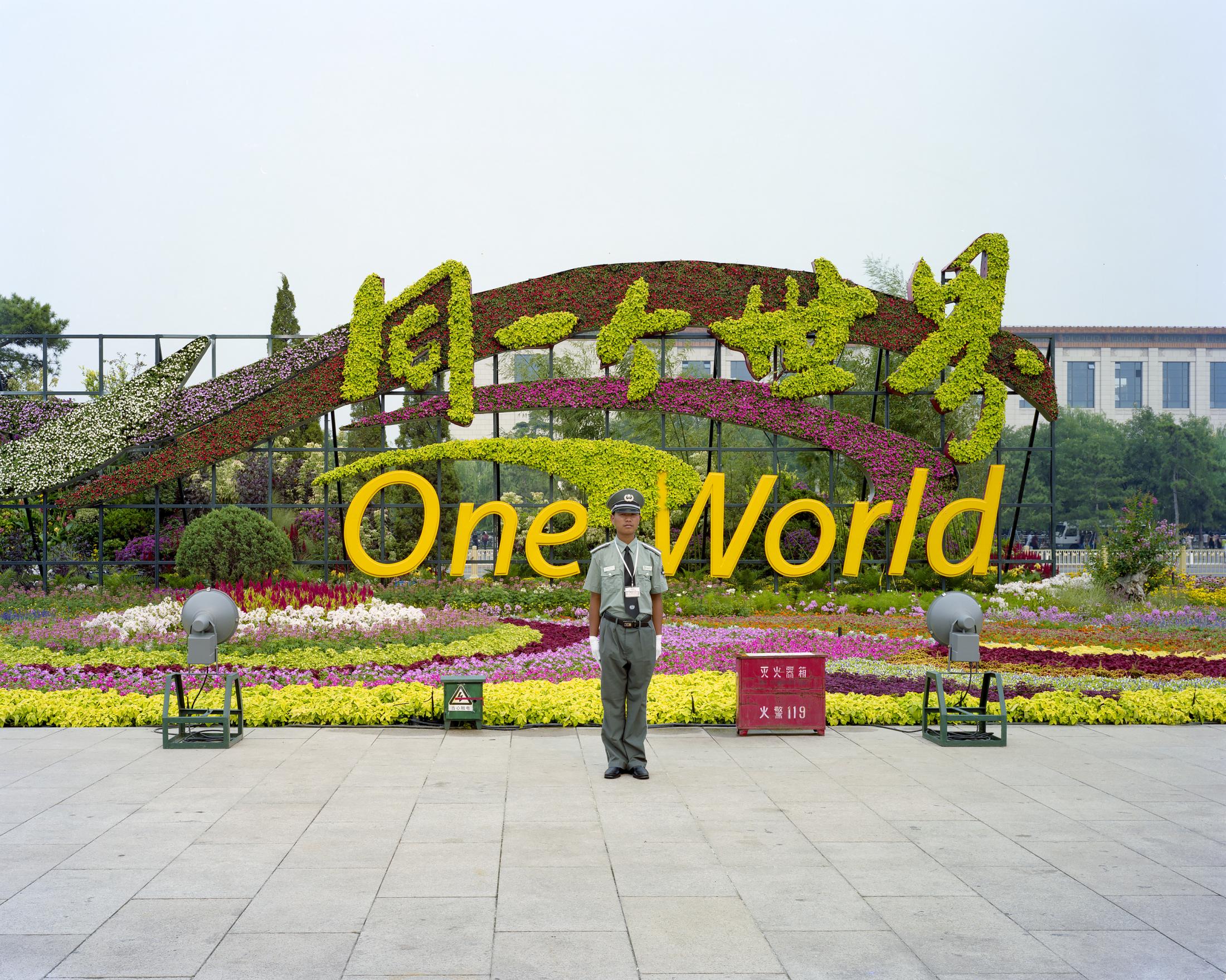
12 / 27
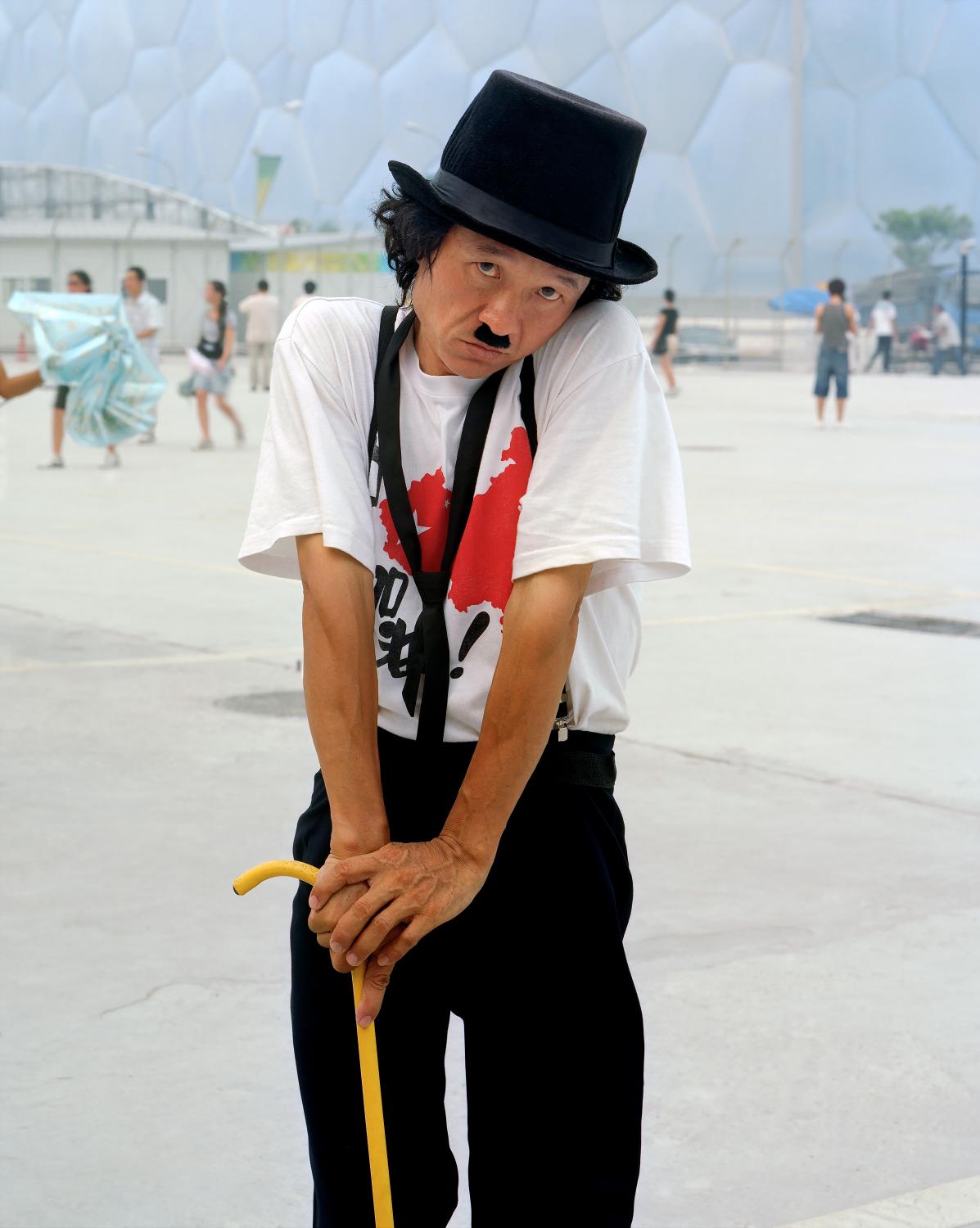
13 / 27
Li Kaiwei, 45, a Chaplin impersonator, walked two months to
Beijing from his hometown Chaozhou, Guangdong Province.
Beijing, 8/2008
李凱為,45歲,從潮州徒步走了兩個月到北京,桌別林扮演者。
北京,8/2008
Beijing from his hometown Chaozhou, Guangdong Province.
Beijing, 8/2008
李凱為,45歲,從潮州徒步走了兩個月到北京,桌別林扮演者。
北京,8/2008
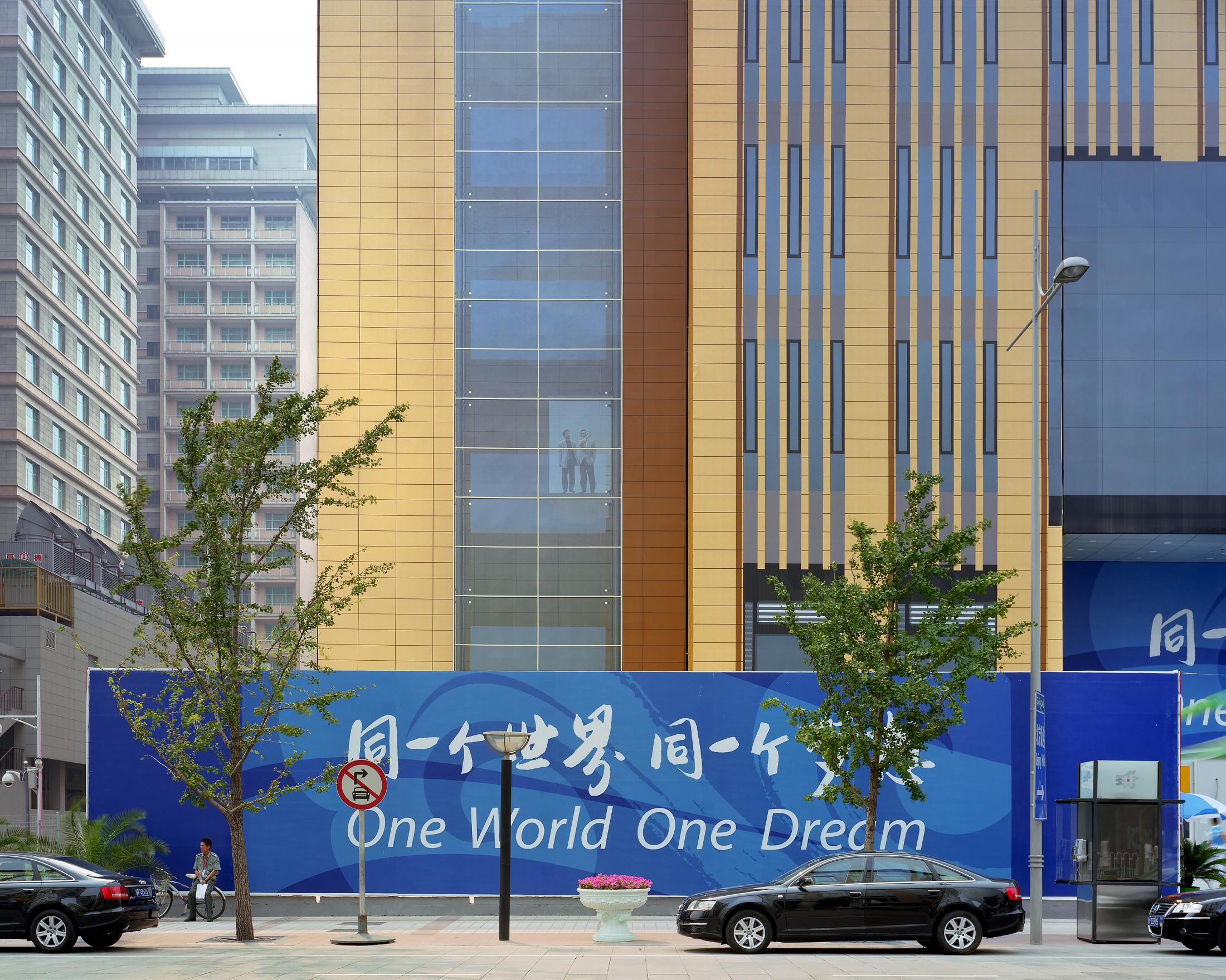
14 / 27
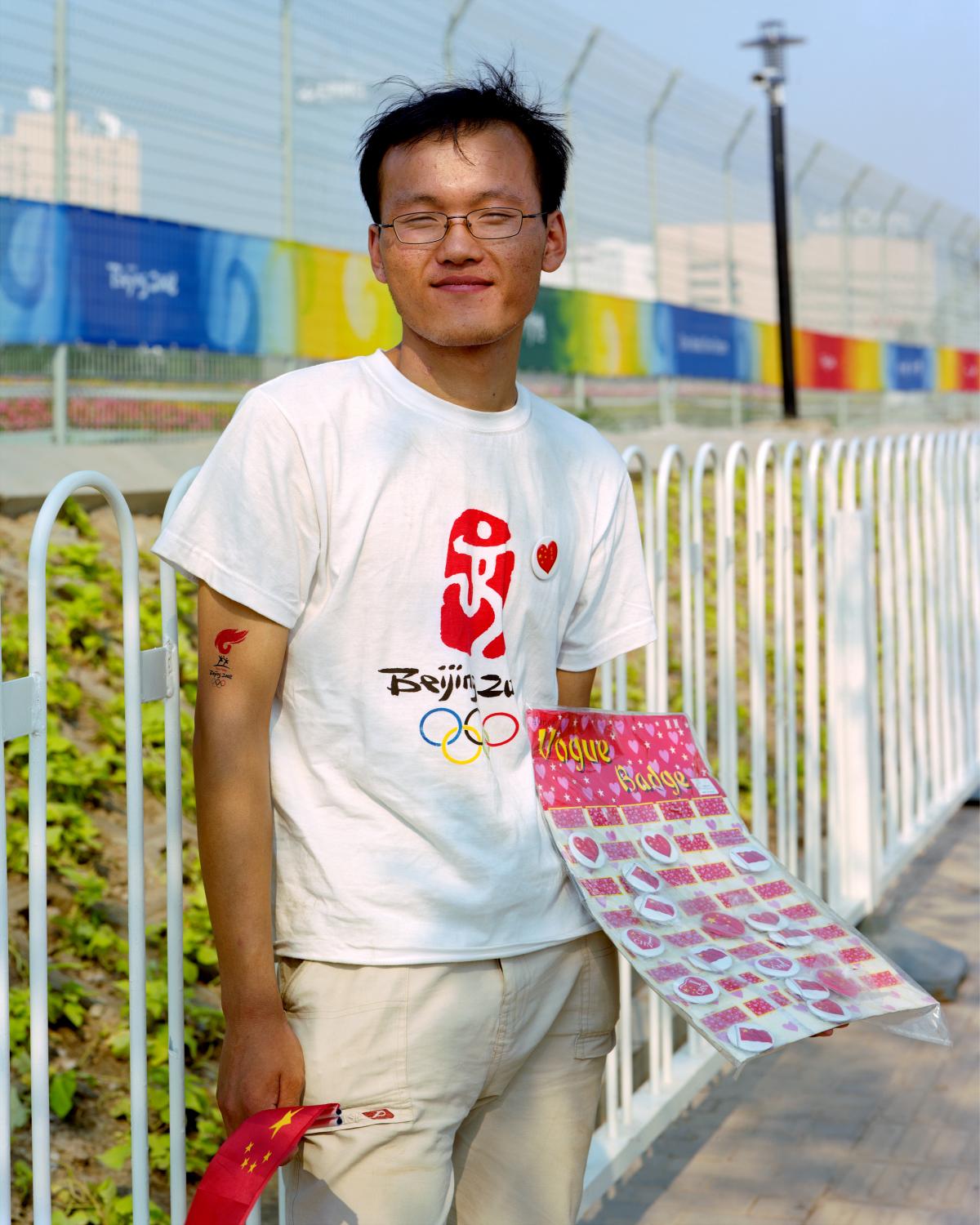
15 / 27
Wang Shuiying, a university student from Anhui, sells souvenir
stickers outside Olympic venues. Beijing, 8/2008
汪水英,來自安徽的大學生,趁暑假在奧運場館外賣貼紙賺外
快。北京,8/2008
stickers outside Olympic venues. Beijing, 8/2008
汪水英,來自安徽的大學生,趁暑假在奧運場館外賣貼紙賺外
快。北京,8/2008
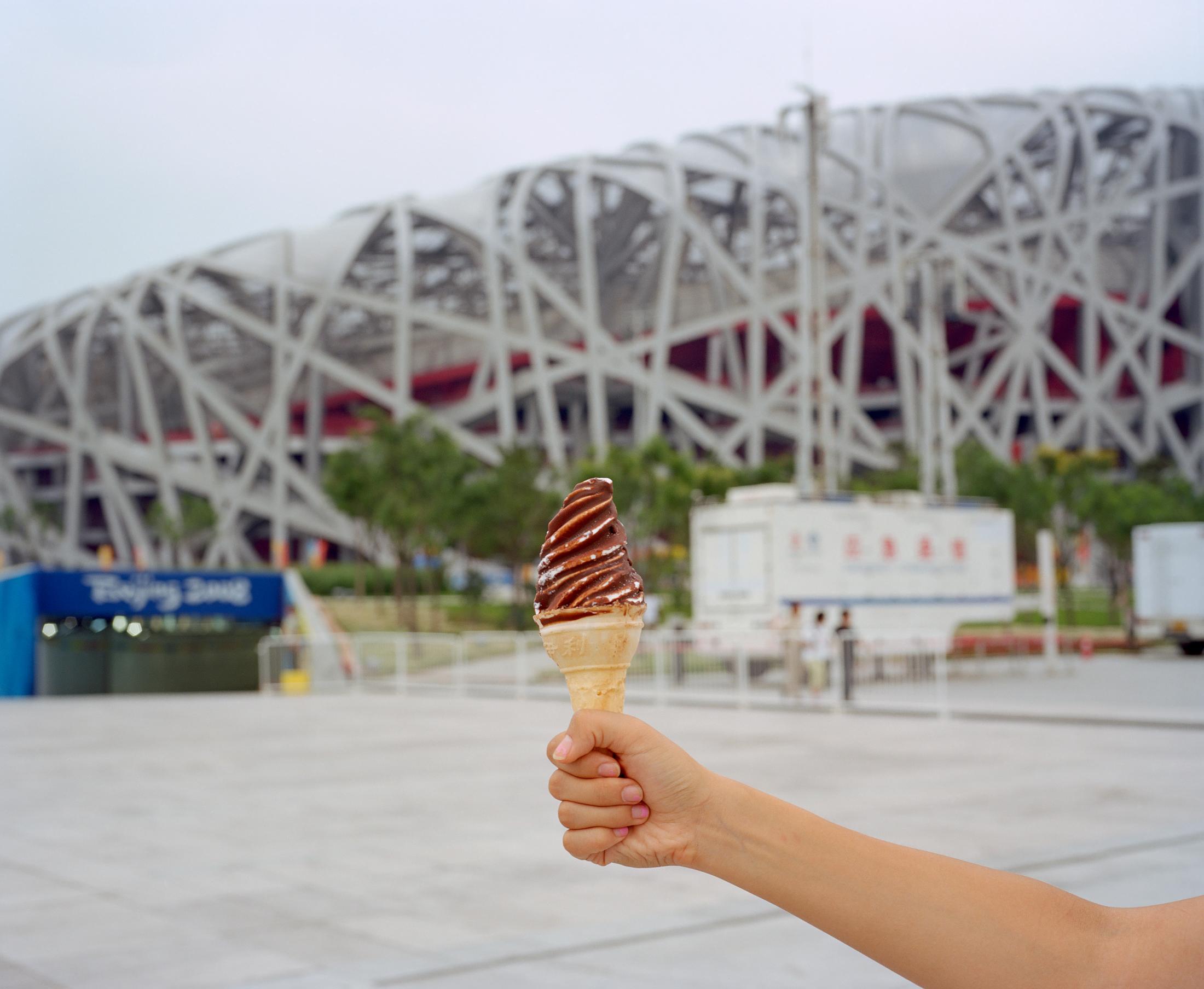
16 / 27
Beijing, 8/2008
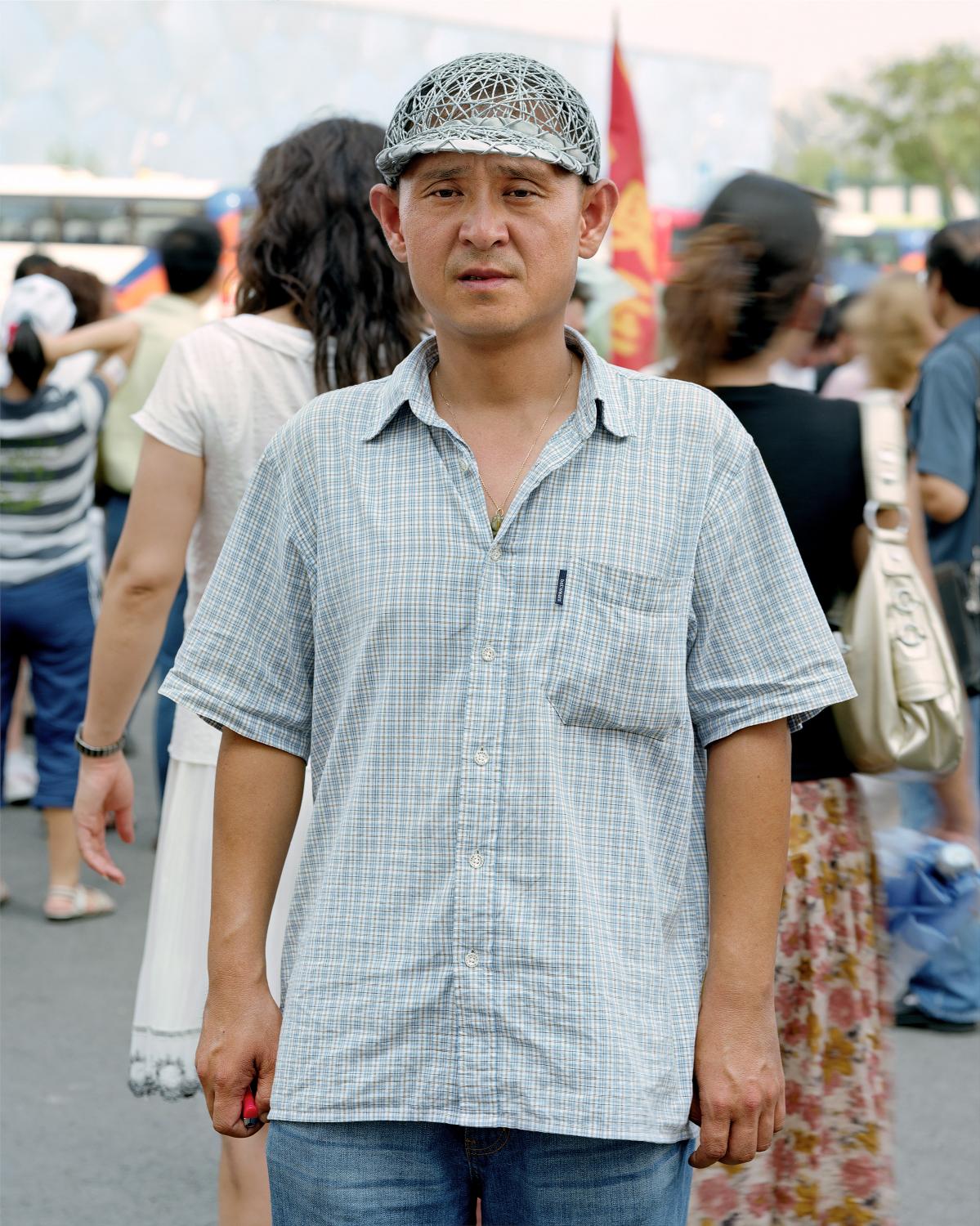
17 / 27
Zhang Hui, 36, from Shenyang, Liaoning Province, wears his
DIY "Bird Nest" cap. Beijing, 8/2008
張輝,36歲,來自沈陽,自製「鳥巢」帽子來湊熱鬧。北京,
8/2008
DIY "Bird Nest" cap. Beijing, 8/2008
張輝,36歲,來自沈陽,自製「鳥巢」帽子來湊熱鬧。北京,
8/2008
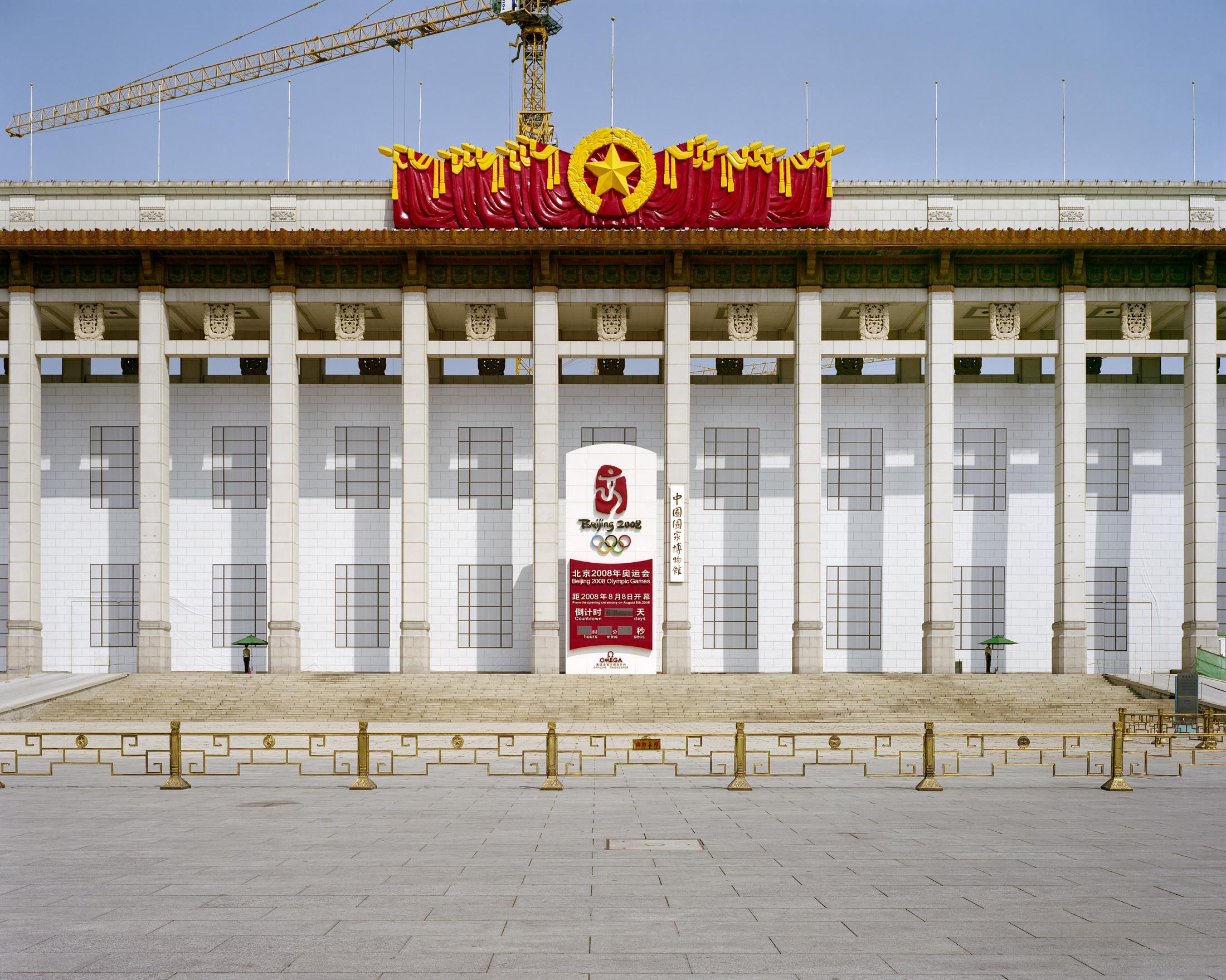
18 / 27
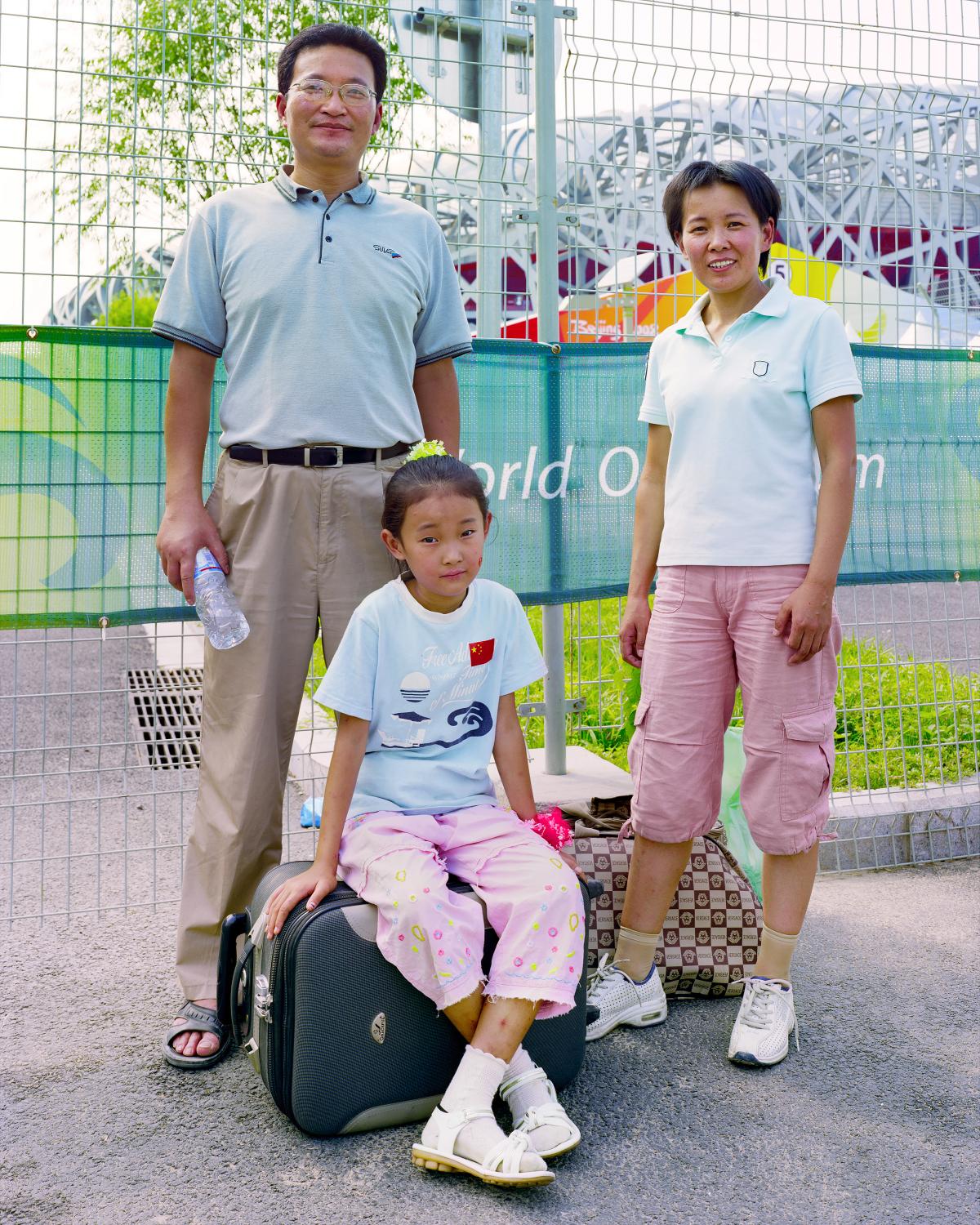
19 / 27
Wang Taoping, 38, with his wife Zhang Xiaoyuan, 37, and
daughter Wang Litao, 8, stop by the "Bird Nest" on the way to
their Hebei home.
王濤平,38歲,和他的妻子張曉媛,37歲,和女兒王麗濤,8
歲,來自河北,路經北京到鳥巢看看。北京,8/2008
daughter Wang Litao, 8, stop by the "Bird Nest" on the way to
their Hebei home.
王濤平,38歲,和他的妻子張曉媛,37歲,和女兒王麗濤,8
歲,來自河北,路經北京到鳥巢看看。北京,8/2008
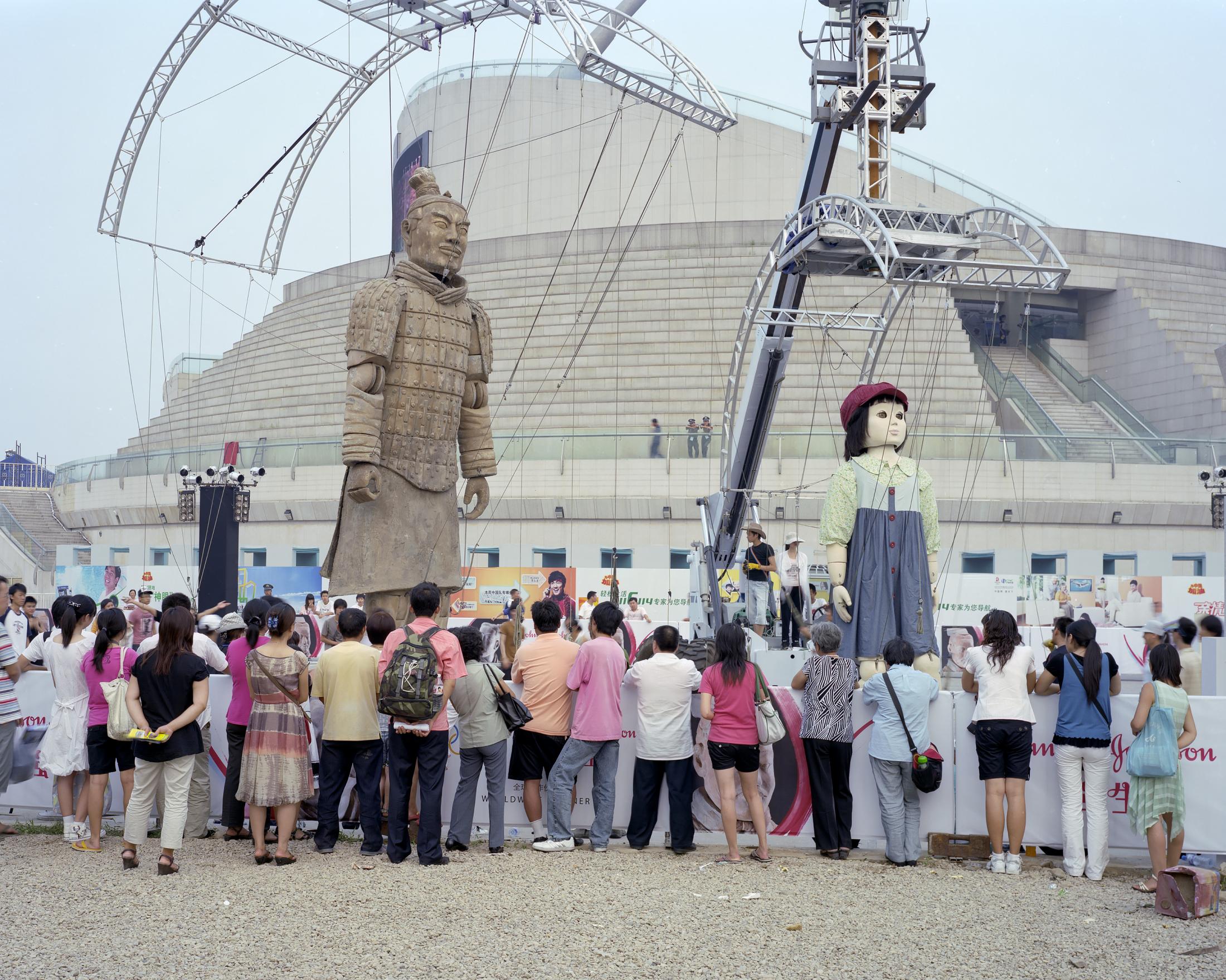
20 / 27
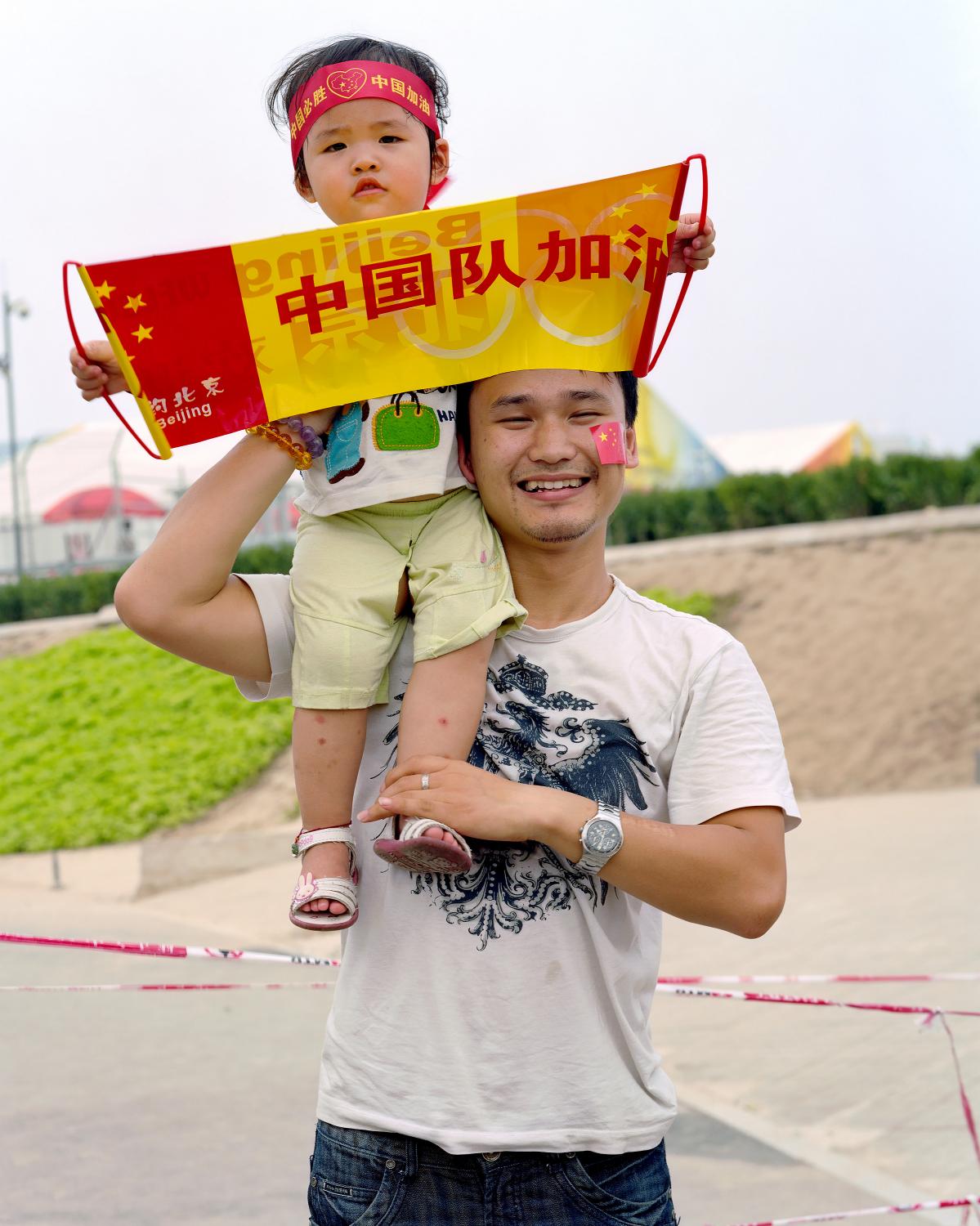
21 / 27
Wu Lin, 24, and his 18-month-old daughter Wu Xinyuan, from
Jiangxi. Beijing, 8/2008
吳林,24歲,和他的一歲半女兒吳欣媛,來自江西。北京,
8/2008
Jiangxi. Beijing, 8/2008
吳林,24歲,和他的一歲半女兒吳欣媛,來自江西。北京,
8/2008
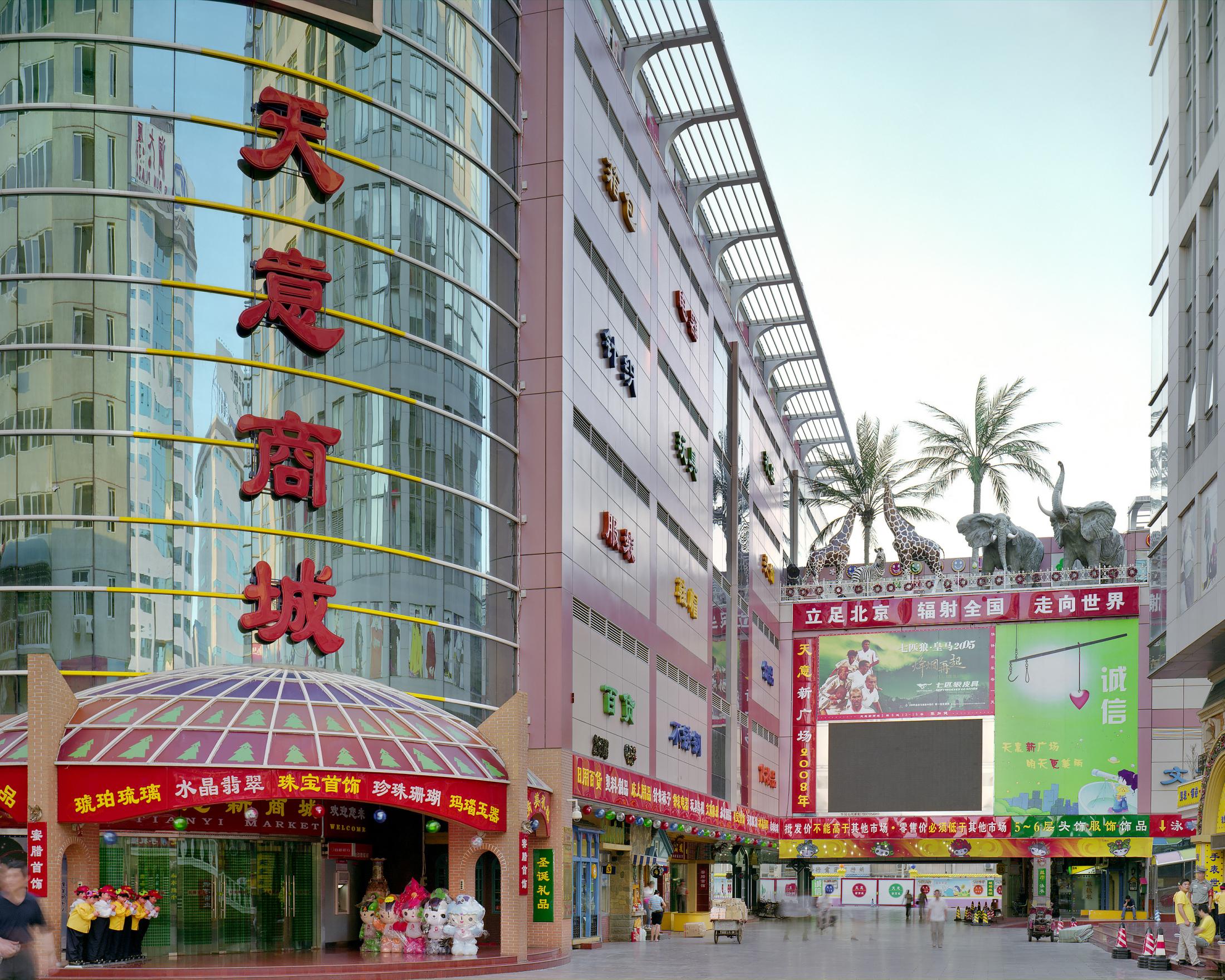
22 / 27
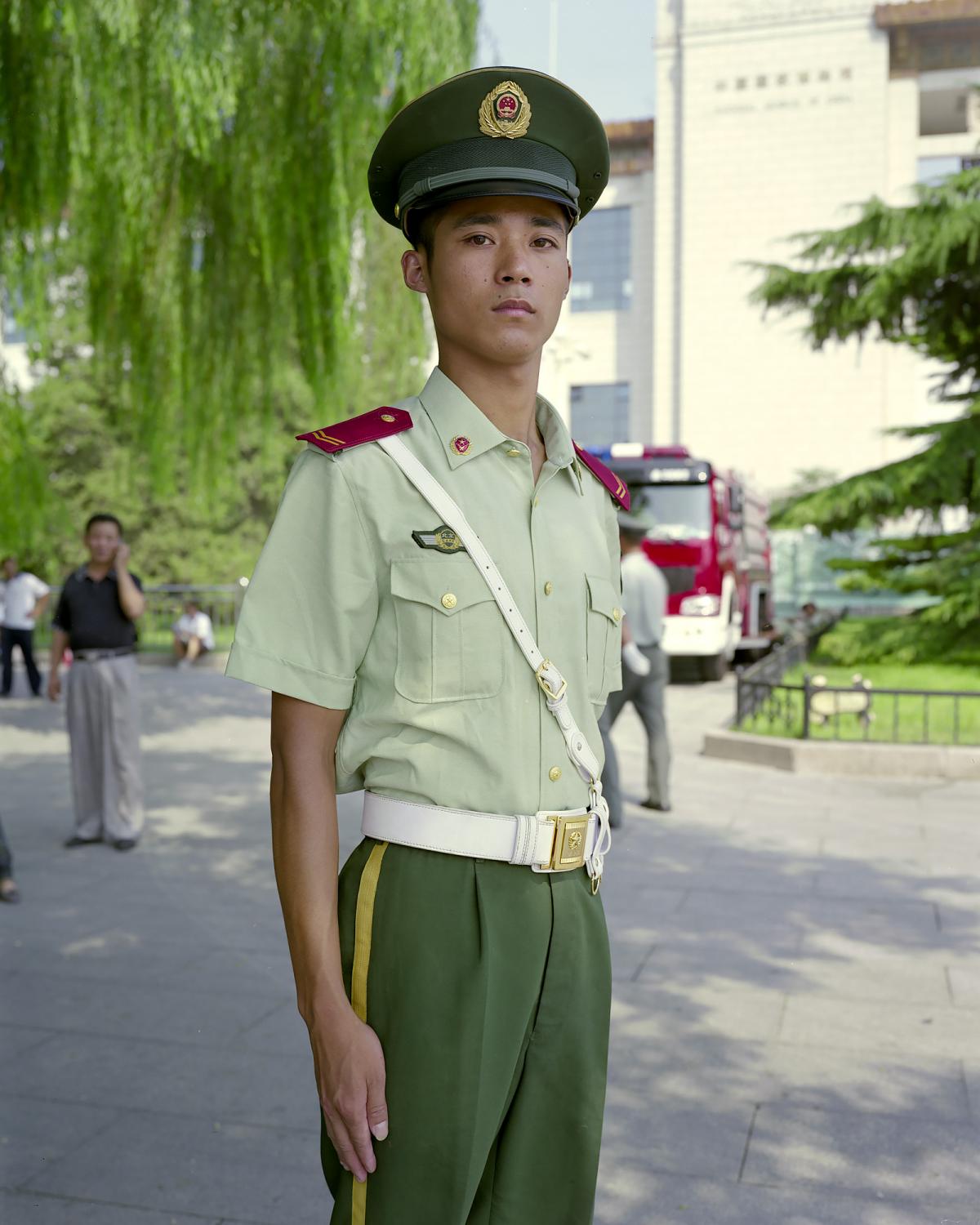
23 / 27
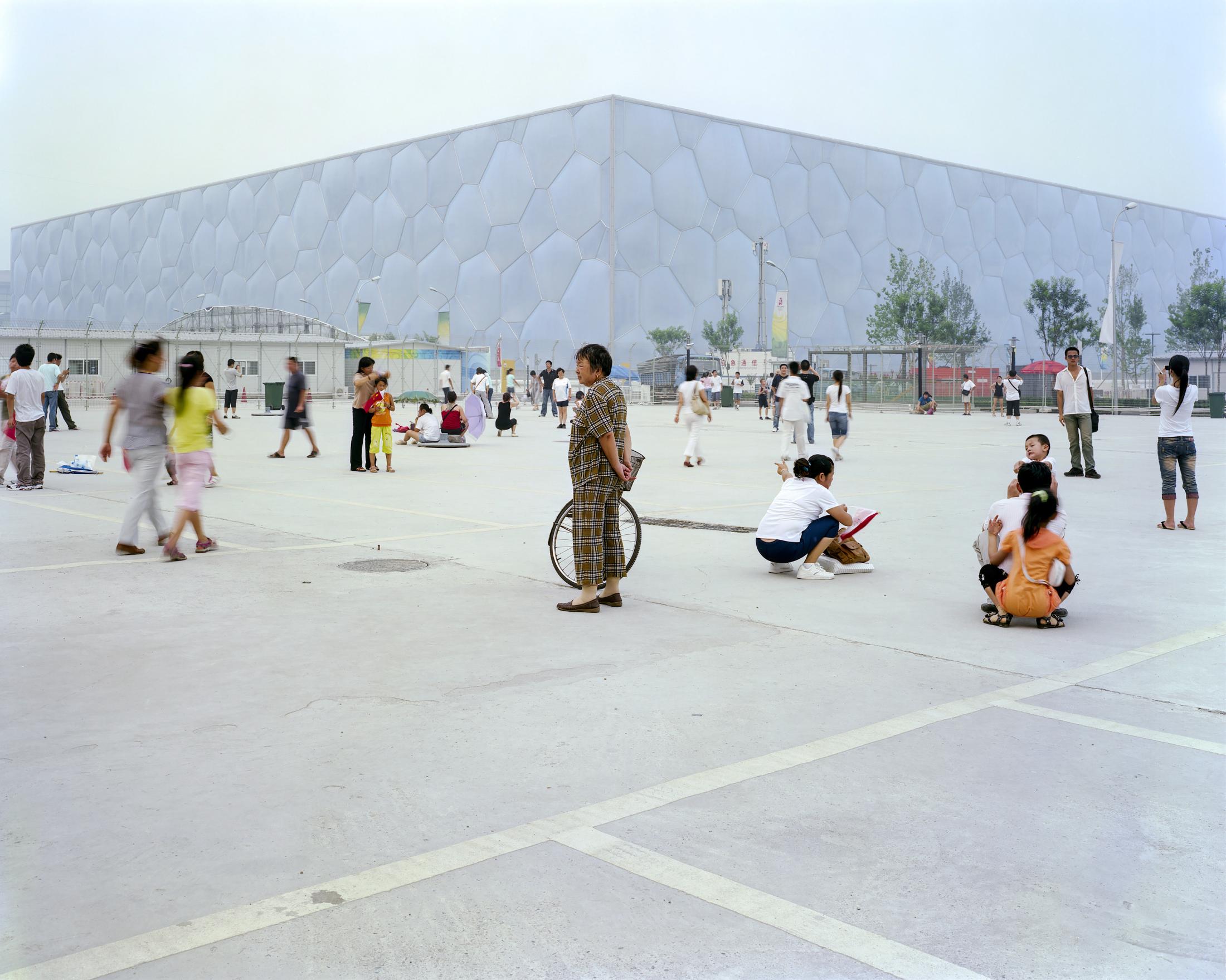
24 / 27
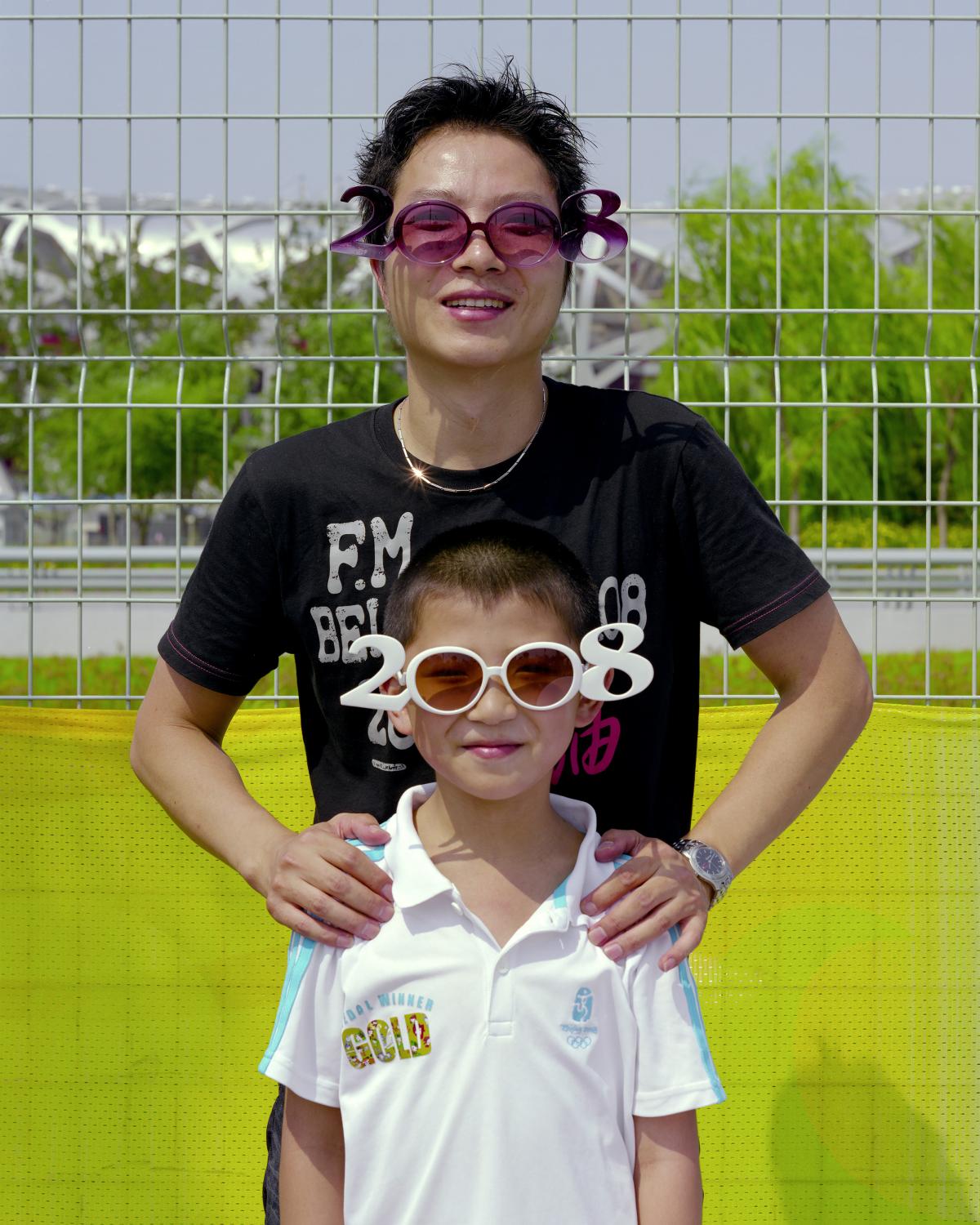
25 / 27
Wu Lin, 24, and his daughter Wu Xinyuan, 1 and a half years old, from Jiangxi.
凌志雲,38歲,和他的10歲兒子凌浩男,來自江蘇楊州。
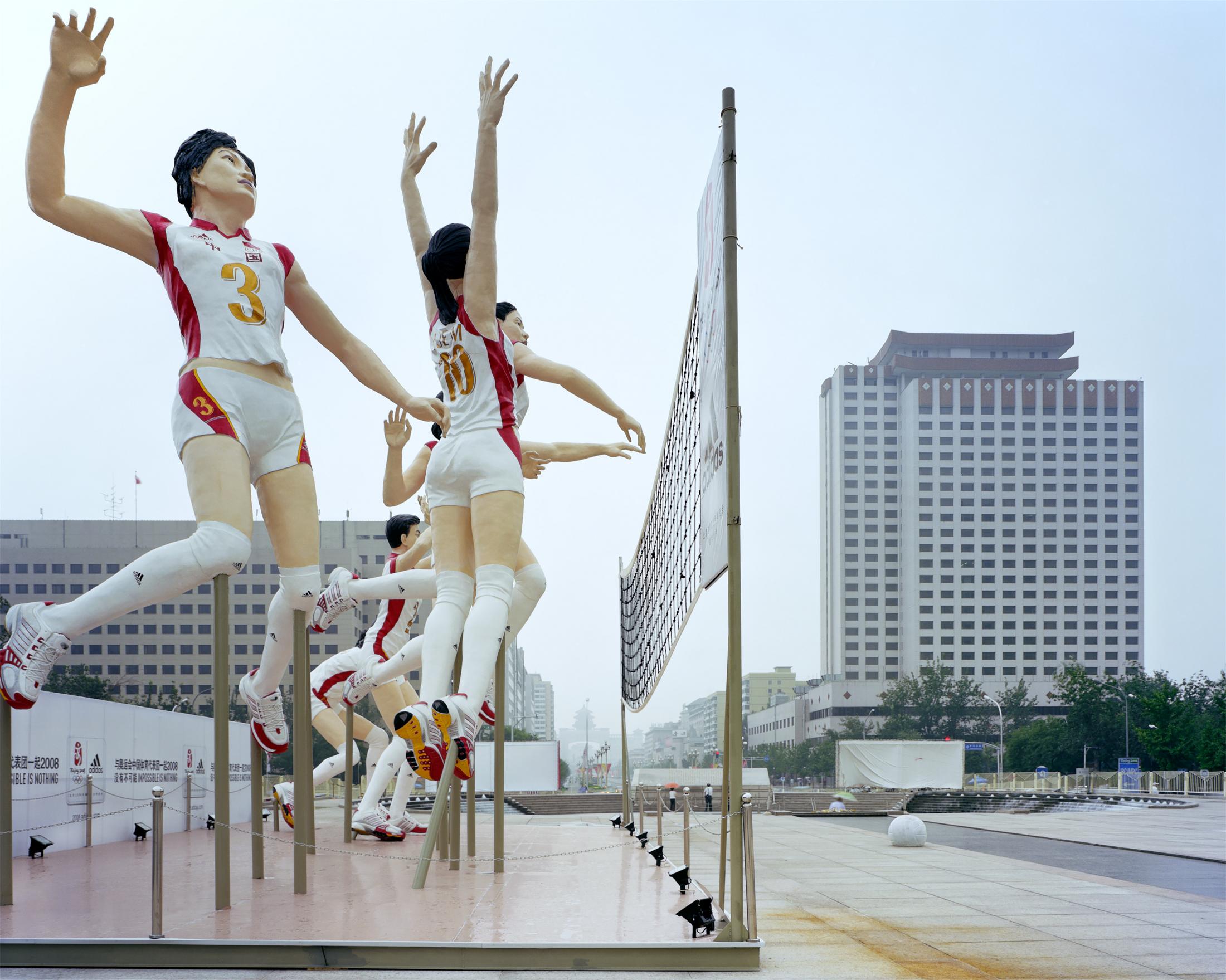
26 / 27
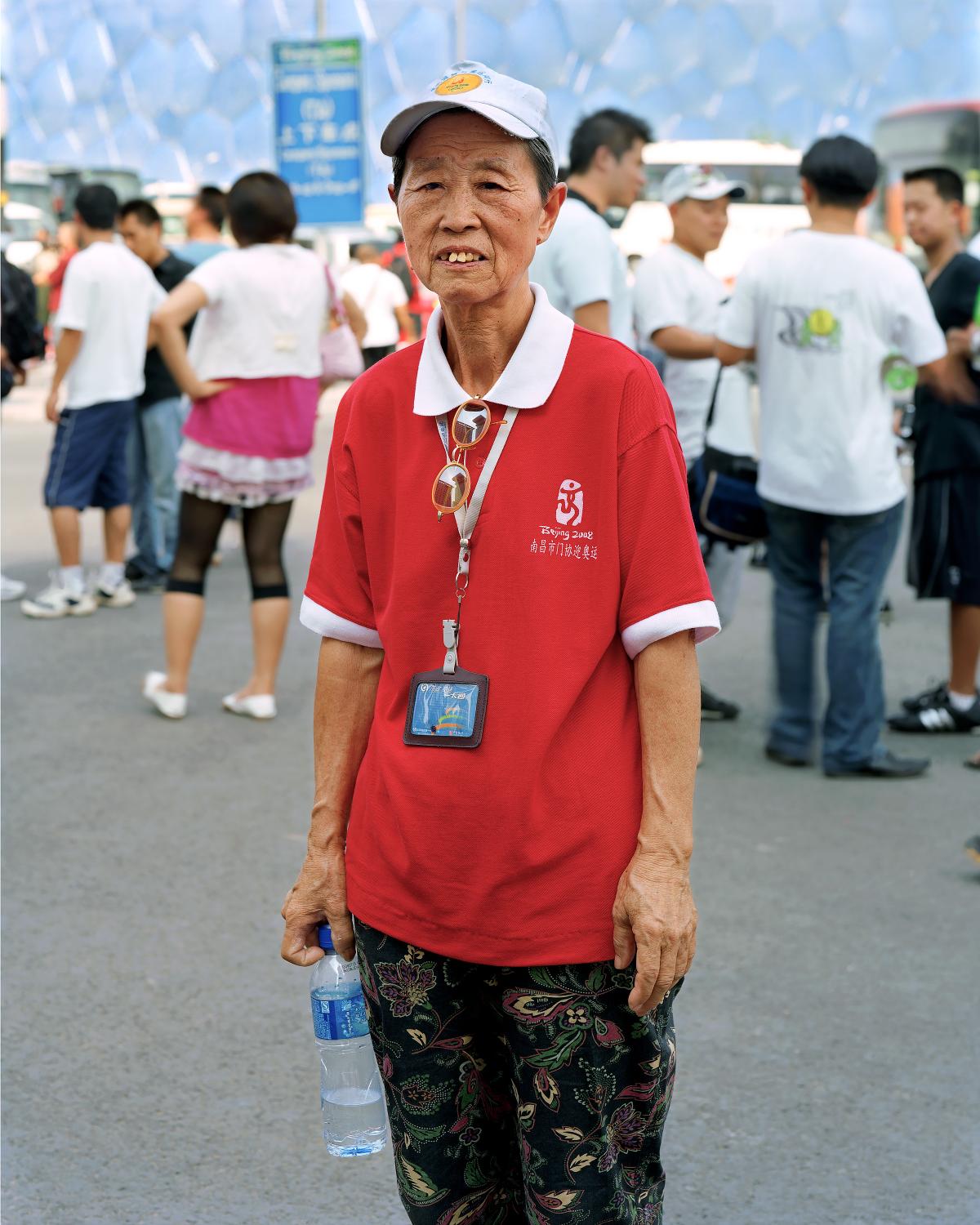
27 / 27
Hong Tingfang, 76, who has got a ticket of teniis match on 12th August, from Nanchang.
洪庭芳,76歲,來自南昌,買了票看8月12日的網球賽。
洪庭芳,76歲,來自南昌,買了票看8月12日的網球賽。
The 2008 Beijing Olympics was of an unprecedented scale in modern Olympic history, in terms of the manpower and money put into it. Many of us may still remember its spectacular and spellbinding opening ceremony, and the torch relay with so many hiccups. The Chinese government perceived the Olympic events and the medals won by Chinese athletes as national glory that could stimulate patriotic sentiments. More importantly, China was so eager to demonstrate its soft power following the economic boom after becoming the “world’s factory”, and the Olympics provided the perfect opportunity. During the Olympics, we saw the five-starred Chinese national flags being more prominent than the Olympic flags with the five rings in the host city of Beijing.
Under the hot summer sun in August, outside the venues of the games, I took portraits of citizens who came from all different provinces of China. Most of them could not afford the tickets, and just came and hang around off the venues to experience the atmosphere and look at the expensive structures built for the games, including the “Bird’s Nest” (Beijing National Stadium) and the “Water Cube” (Beijing National Aquatics Center). These venues, together with the almost ecstatic atmosphere in the capital city, worked like a magnet drawing crowds from all over China. People behaved collectively in the same unnameable manner, to express their pride as if these venues were built for them. Although this was not the case in reality, they still enjoyed themselves without any complaint. Beneath the happiness engraved on their faces was patriotism that shrouded the whole Beijing city.
At the same time, the massive efforts to facelift the city owing to the Olympics resulted in little harmony with the people. This ambiguous contrast between the people and the city inspired me to think of the other side of the story. The Chinese people themselves were perhaps the real “Olympic athletes”. Although they knew they would not win any medals, nor would their sacrifices be rewarded, they still put their hopes on the Olympics and on their country.
Under the hot summer sun in August, outside the venues of the games, I took portraits of citizens who came from all different provinces of China. Most of them could not afford the tickets, and just came and hang around off the venues to experience the atmosphere and look at the expensive structures built for the games, including the “Bird’s Nest” (Beijing National Stadium) and the “Water Cube” (Beijing National Aquatics Center). These venues, together with the almost ecstatic atmosphere in the capital city, worked like a magnet drawing crowds from all over China. People behaved collectively in the same unnameable manner, to express their pride as if these venues were built for them. Although this was not the case in reality, they still enjoyed themselves without any complaint. Beneath the happiness engraved on their faces was patriotism that shrouded the whole Beijing city.
At the same time, the massive efforts to facelift the city owing to the Olympics resulted in little harmony with the people. This ambiguous contrast between the people and the city inspired me to think of the other side of the story. The Chinese people themselves were perhaps the real “Olympic athletes”. Although they knew they would not win any medals, nor would their sacrifices be rewarded, they still put their hopes on the Olympics and on their country.

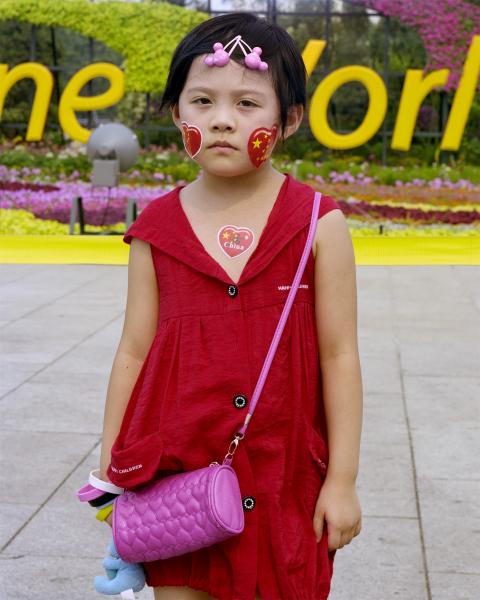
























The 2008 Beijing Olympics was of an unprecedented scale in modern Olympic history, in terms of the manpower and money put into it. Many of us may still remember its spectacular and spellbinding opening ceremony, and the torch relay with so many hiccups. The Chinese government perceived the Olympic events and the medals won by Chinese athletes as national glory that could stimulate patriotic sentiments. More importantly, China was so eager to demonstrate its soft power following the economic boom after becoming the “world’s factory”, and the Olympics provided the perfect opportunity. During the Olympics, we saw the five-starred Chinese national flags being more prominent than the Olympic flags with the five rings in the host city of Beijing.
Under the hot summer sun in August, outside the venues of the games, I took portraits of citizens who came from all different provinces of China. Most of them could not afford the tickets, and just came and hang around off the venues to experience the atmosphere and look at the expensive structures built for the games, including the “Bird’s Nest” (Beijing National Stadium) and the “Water Cube” (Beijing National Aquatics Center). These venues, together with the almost ecstatic atmosphere in the capital city, worked like a magnet drawing crowds from all over China. People behaved collectively in the same unnameable manner, to express their pride as if these venues were built for them. Although this was not the case in reality, they still enjoyed themselves without any complaint. Beneath the happiness engraved on their faces was patriotism that shrouded the whole Beijing city.
At the same time, the massive efforts to facelift the city owing to the Olympics resulted in little harmony with the people. This ambiguous contrast between the people and the city inspired me to think of the other side of the story. The Chinese people themselves were perhaps the real “Olympic athletes”. Although they knew they would not win any medals, nor would their sacrifices be rewarded, they still put their hopes on the Olympics and on their country.
Under the hot summer sun in August, outside the venues of the games, I took portraits of citizens who came from all different provinces of China. Most of them could not afford the tickets, and just came and hang around off the venues to experience the atmosphere and look at the expensive structures built for the games, including the “Bird’s Nest” (Beijing National Stadium) and the “Water Cube” (Beijing National Aquatics Center). These venues, together with the almost ecstatic atmosphere in the capital city, worked like a magnet drawing crowds from all over China. People behaved collectively in the same unnameable manner, to express their pride as if these venues were built for them. Although this was not the case in reality, they still enjoyed themselves without any complaint. Beneath the happiness engraved on their faces was patriotism that shrouded the whole Beijing city.
At the same time, the massive efforts to facelift the city owing to the Olympics resulted in little harmony with the people. This ambiguous contrast between the people and the city inspired me to think of the other side of the story. The Chinese people themselves were perhaps the real “Olympic athletes”. Although they knew they would not win any medals, nor would their sacrifices be rewarded, they still put their hopes on the Olympics and on their country.


Yang Zeyu, 6, from Dalian. Beijing. 8/2008
楊澤玉,6歲,來自大連。北京,8/2008
楊澤玉,6歲,來自大連。北京,8/2008


Shi Changlin, 56, a Heilongjiang native, rode his decorated tricycle for over 3,600km to Beijing from Yunnan where he ran a small business. Beijing, 8/2008
石長林,56歲,來自黑龍江雞西,本來在雲南做小生意,騎了3600公里三輪車來到北京。北京,8/2008
石長林,56歲,來自黑龍江雞西,本來在雲南做小生意,騎了3600公里三輪車來到北京。北京,8/2008


Silly Egg (alias), a university student from Guangzhou.
傻蛋(網名),廣州大學學生,赴京旅遊。北京,8/2008
傻蛋(網名),廣州大學學生,赴京旅遊。北京,8/2008


Wen Shengchu, from Guangxi Province, welcomes Olympic
visitors from around the world to China by setting up over 200
miniature flagpoles on his head. Not long ago Wei broke the
world records by peppering his head with 2,008 needles as a
way to commemorate the opening ceremony of the Olympics.
Beijing, 8/2008
韋盛初,來自廣西南寧,聲稱為了迎接來自全世界的奧運遊客,
將200多面小國旗插在自己的頭上。不久前他為了紀念奧運會開
幕,用2008根針扎在自己頭上來打破世界紀錄。北京,8/2008
visitors from around the world to China by setting up over 200
miniature flagpoles on his head. Not long ago Wei broke the
world records by peppering his head with 2,008 needles as a
way to commemorate the opening ceremony of the Olympics.
Beijing, 8/2008
韋盛初,來自廣西南寧,聲稱為了迎接來自全世界的奧運遊客,
將200多面小國旗插在自己的頭上。不久前他為了紀念奧運會開
幕,用2008根針扎在自己頭上來打破世界紀錄。北京,8/2008


Li Baokui, from Anhui, is a Olympic Torch volunteer guard.
Beijing, 8/2008
李寶奎,來自安徽,奧運火炬護送志願者。北京,8/2008
Beijing, 8/2008
李寶奎,來自安徽,奧運火炬護送志願者。北京,8/2008


Li Kaiwei, 45, a Chaplin impersonator, walked two months to
Beijing from his hometown Chaozhou, Guangdong Province.
Beijing, 8/2008
李凱為,45歲,從潮州徒步走了兩個月到北京,桌別林扮演者。
北京,8/2008
Beijing from his hometown Chaozhou, Guangdong Province.
Beijing, 8/2008
李凱為,45歲,從潮州徒步走了兩個月到北京,桌別林扮演者。
北京,8/2008


Wang Shuiying, a university student from Anhui, sells souvenir
stickers outside Olympic venues. Beijing, 8/2008
汪水英,來自安徽的大學生,趁暑假在奧運場館外賣貼紙賺外
快。北京,8/2008
stickers outside Olympic venues. Beijing, 8/2008
汪水英,來自安徽的大學生,趁暑假在奧運場館外賣貼紙賺外
快。北京,8/2008

Beijing, 8/2008

Zhang Hui, 36, from Shenyang, Liaoning Province, wears his
DIY "Bird Nest" cap. Beijing, 8/2008
張輝,36歲,來自沈陽,自製「鳥巢」帽子來湊熱鬧。北京,
8/2008
DIY "Bird Nest" cap. Beijing, 8/2008
張輝,36歲,來自沈陽,自製「鳥巢」帽子來湊熱鬧。北京,
8/2008


Wang Taoping, 38, with his wife Zhang Xiaoyuan, 37, and
daughter Wang Litao, 8, stop by the "Bird Nest" on the way to
their Hebei home.
王濤平,38歲,和他的妻子張曉媛,37歲,和女兒王麗濤,8
歲,來自河北,路經北京到鳥巢看看。北京,8/2008
daughter Wang Litao, 8, stop by the "Bird Nest" on the way to
their Hebei home.
王濤平,38歲,和他的妻子張曉媛,37歲,和女兒王麗濤,8
歲,來自河北,路經北京到鳥巢看看。北京,8/2008


Wu Lin, 24, and his 18-month-old daughter Wu Xinyuan, from
Jiangxi. Beijing, 8/2008
吳林,24歲,和他的一歲半女兒吳欣媛,來自江西。北京,
8/2008
Jiangxi. Beijing, 8/2008
吳林,24歲,和他的一歲半女兒吳欣媛,來自江西。北京,
8/2008




Wu Lin, 24, and his daughter Wu Xinyuan, 1 and a half years old, from Jiangxi.
凌志雲,38歲,和他的10歲兒子凌浩男,來自江蘇楊州。


Hong Tingfang, 76, who has got a ticket of teniis match on 12th August, from Nanchang.
洪庭芳,76歲,來自南昌,買了票看8月12日的網球賽。
洪庭芳,76歲,來自南昌,買了票看8月12日的網球賽。